FLORIDA ATLANTIC SCHMIDT COLLEGE OF MEDICINE






Dean’s Annual Report 2022

OF THE COMMUNITY, FOR THE COMMUNITY








OF THE COMMUNITY, FOR THE COMMUNITY
On February 14, 2022, I was fortunate to join the great students, staff and faculty of the Schmidt College of Medicine at Florida Atlantic University (FAU). Instantaneously, I felt the sense of community and embraced the humbling responsibility to serve as the dean of the only medical school in Palm Beach County, which is committed to improving the care and well-being of the 3.9 million patients in our service area.
My first 100 days were spent in back-to-back meetings with internal and external stakeholders, visits to many of our community partners and hospitals and trips to FAU campuses across the state. The purpose of these visits enabled me to not only understand processes, but more importantly, to understand the culture and values of our college, FAU and the region.
Within my first 100 days, we also were fortunate to receive a transformational pledge of $28 million from Ann and John Wood and the Fairfax Wood Scholarship Foundation to support scholarships for our medical students. This is the largest scholarship gift in FAU’s history, representing part of the Woods’ aspirational goal of creating “doctors without debt.” FAU has a distinguished history of philanthropy since it opened its doors in 1964. The continued generosity of Dick and Barb Schmidt to FAU, and to the College of Medicine is truly commendable.
Soon after my arrival, FAU President John Kelly and Brad Levine, chair of FAU’s Board of Trustees, announced the inception of the FAU Health Network. The network’s mission is to transcend the competitive landscape through education and research collaborations between the region’s leading
Julie G. Pilitsis M.D.,Ph.D.,M.B.A. Dean and Vice President of Medical Affairs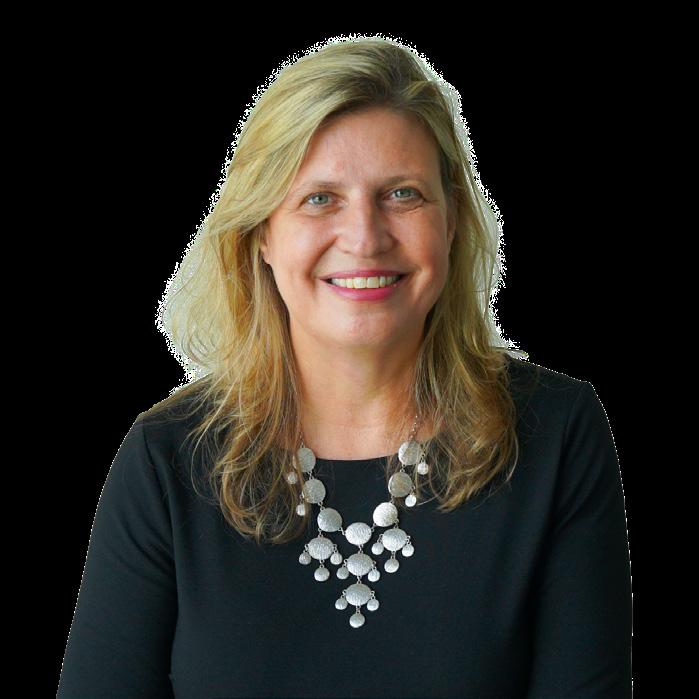
public and private academic and medical leaders. Internally, we have created the FAU Health Network to maximize interactions between the FAU colleges of science, nursing, medicine, engineering and computer science, education, arts and letters, social work and criminal justice, and business to expand our ability to train the needed workforce in an interprofessional environment. Regional partners in Palm Beach, Broward and Martin counties offer outstanding opportunities for dynamic faculty and learner experiences; connectivity to the local healthcare community; and the recruitment and retention of our superbly skilled healthcare professionals. These collaborative academic endeavors allow for innovative solutions necessary to tackle the workforce crisis.
Community remains at the forefront of my vision. In our recent graduating medical school classes, 50 percent of women and 30 percent of students historically underrepresented in medicine remained in Florida for their residency. Further, 50 percent of our graduating residents and fellows chose to practice in Florida. As our state’s population grows, we must increase our healthcare workforce. As such, during the next five years, we will increase our medical student class size and residency positions.
Physicians are only part of developing a robust healthcare workforce. We also will work with all FAU colleges and surrounding universities to ensure that students interested in healthcare fields are nurtured and supported regardless of their degree program. Finally, we will increase pathways at FAU to ensure that the next generations in healthcare are, indeed, “Of the community, for the community.”
As the new dean, Julie G. Pilitsis, M.D., Ph.D., M.B.A., is taking FAU’s Schmidt College of Medicine to new heights. A leading neurosurgeon and physician-scientist, she has made significant contributions nationally in medicine, education, advocacy and research. Now, she has big plans to propel the college’s innovative medical and graduate medical education programs, leading-edge research and clinical practice.
“I am thrilled to lead the Schmidt College of Medicine in collaboration with my colleagues throughout the college and university as well as our many dedicated community partners and supporters,” said Dr. Pilitsis. “Together, we are embarking on a new chapter of healthcare in South Florida to ensure the depth and breadth of the workforce of today and tomorrow.”
Before joining FAU, Dr. Pilitsis served as chair and professor of the Department of Neuroscience and Experimental Therapeutics at Albany Medical College (AMC) in New York. During her tenure, the department’s grant funding increased tenfold; academic productivity, as measured by publications, increased fourfold; and graduate students who self-identify as underrepresented in medicine increased by 40 percent.
As division chief of functional neurosurgery at AMC, Dr. Pilitsis developed the service line of functional neurosurgery, a subspecialty of neurosurgery aimed at improving quality of life, which includes multidisciplinary pain and movement disorders teams. The group performed 650 operative procedures each year and Dr. Pilitsis will continue her practice in South Florida at the Marcus Neuroscience Institute in Boca Raton.
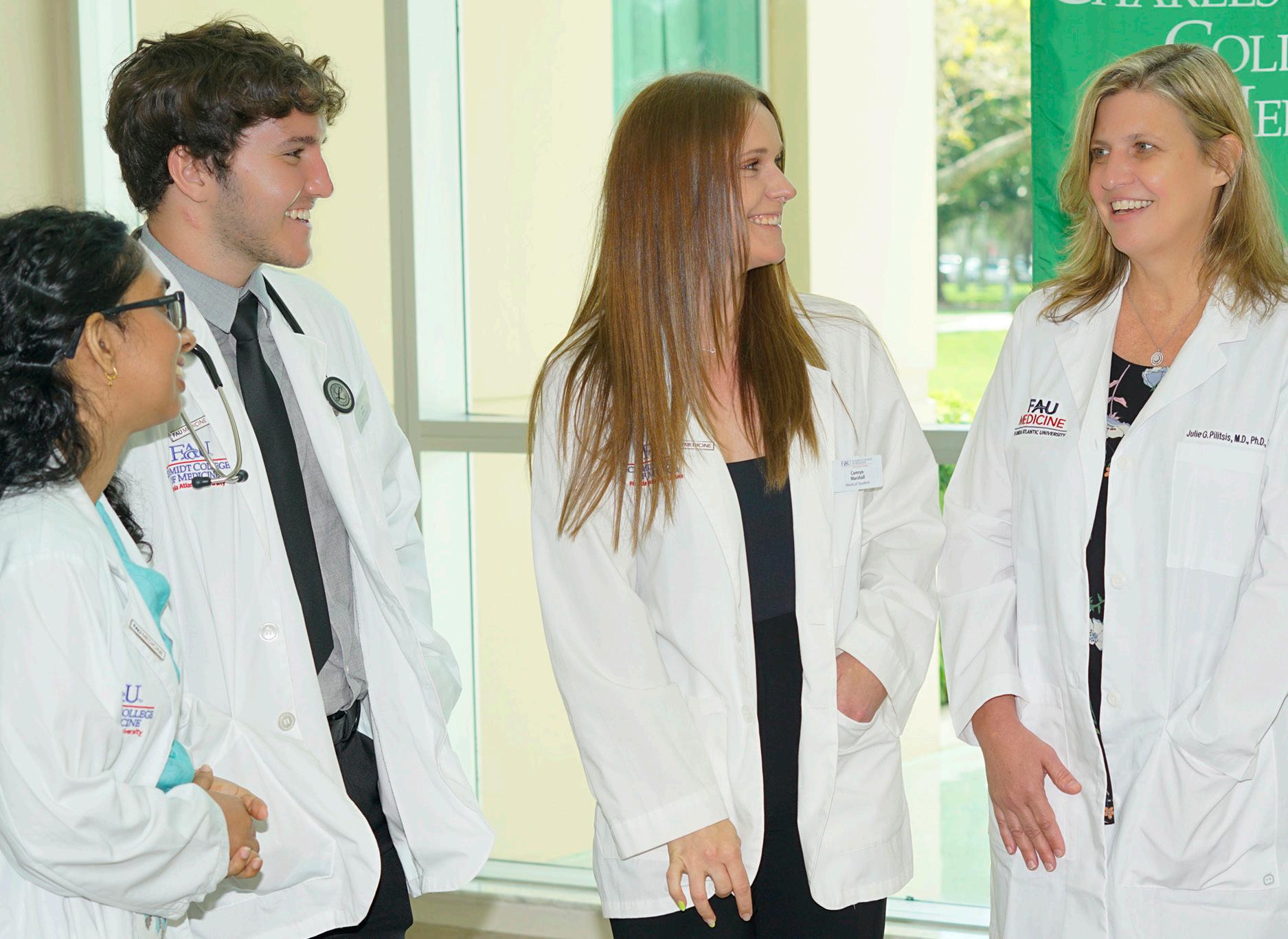
Dr. Pilitsis is a strong supporter of interdisciplinary collaboration. Together with a colleague, she designed an inter-professional (M.D., Ph.D., nursing and allied health) team-based master’s degree curriculum in clinical investigation and junior faculty development program.
Funded by the National Institutes of Health for more than a decade, Dr. Pilitsis has served as a principal investigator (PI) on eight grants totaling more than $20 million. She has served as PI on an additional 21 grants sponsored by other groups. A national leader across multiple organizations, Dr. Pilitsis has served in leadership roles in numerous organizations and was recently named president-elect of the North American Neuromodulation Society, which has approximately 2,000 members, and the American Society of Stereotactic and Functional Neurosurgery.
Dr. Pilitsis is a frequent presenter at national meetings and at neurosurgical grand rounds across the country including a very popular TED Talk titled, “So You Want to be a Neurosurgeon,” which has had more than 250,000 views.
She received her M.D. with distinction from AMC in 1998, her Ph.D. in physiology from Wayne State University in Detroit in 2002, and her M.B.A. with a concentration in health informatics in 2022, from Fayetteville State University.
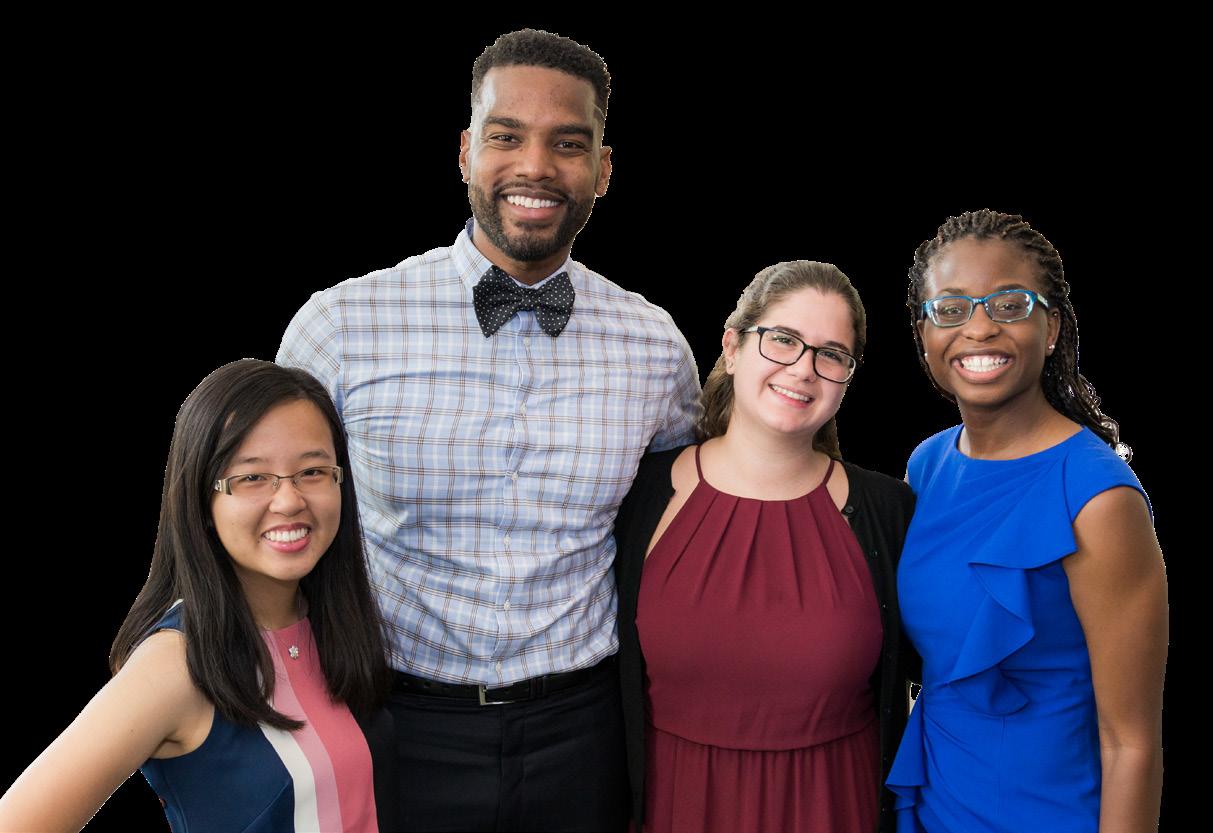
Founded in 1961, FAU serves more than 30,000 undergraduate and graduate students across six campuses located along the southeast Florida coast. FAU ranks as the most racially, ethnically and culturally diverse institution in Florida’s State University System and continues to ensure that higher education is accessible for everyone. At FAU, students from historically marginalized populations, and those who are Pell-eligible, outpace the overall student graduation rates at the university. In fact, FAU ranked second in Florida in the College Consensus “2022 Best Value Colleges and Universities” and No. 24 out of 100 overall. FAU is proud to be recognized for maintaining a low cost of attendance while providing transformative educational experiences. Further reflecting the university’s “Success for All” campaign, FAU was named a member of the Age-Friendly University (AFU) Global Network in 2022. Together, these points of pride foster a well-rounded, united workforce.
Employing big data and student-centered analytics, FAU cultivates achievement among students, through educational access and excellence. Ultimately, FAU embodies a culture of strategic and collaborative community engagement, resulting in mutual benefits for the institution’s colleges and the broader community it serves.

The Schmidt College of Medicine is one of the newest and rapidly rising medical schools and is already nationally recognized in the U.S. News and World Report for its mission to care for diverse patient populations. The college maintains partnerships with more than 300 community agencies from Miami-Dade to Vero Beach to serve the community.
Recognized for innovative education and research, interprofessional initiatives can deliver personalized, data-driven, patient care for the evolving needs of the community. Ultimately, collaborations with healthcare, data analytics and engineering can improve the quality of healthcare. Within a vibrant culture that encourages ingenuity, FAU’s colleges of medicine, nursing, and engineering and computer science as well as the Center for Smart Health, will develop reliable, patient-centered care technologies and informatics. Through interdisciplinary education, students and resident physicians are trained for “jobs of the future,” – careers at the intersection of technology, medicine, nursing, public health and human biology.
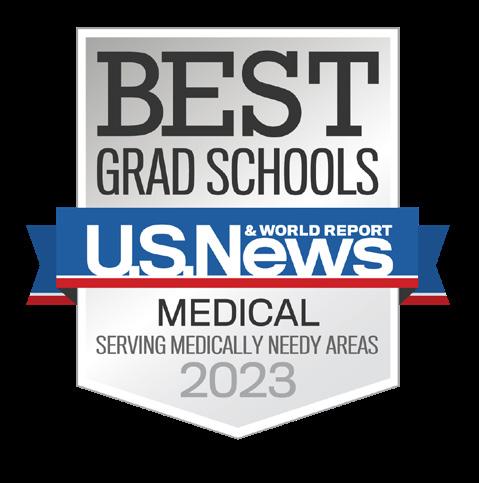
An important mission to revolutionize healthcare is to fully integrate medical education and artificial intelligence (AI) for accessible patient care. Therefore, complementary fields with partners who contribute to the changing needs of the healthcare landscape is vital. Poised at the forefront of the digital health revolution, the fields of engineering and computer science leverage complementary strengths to impact the workforce supply; and potentially transform the healthcare delivery method for the community’s most vulnerable members. The basis for revolutionizing healthcare is an education that starts in pre-school and extends through post-graduate training.
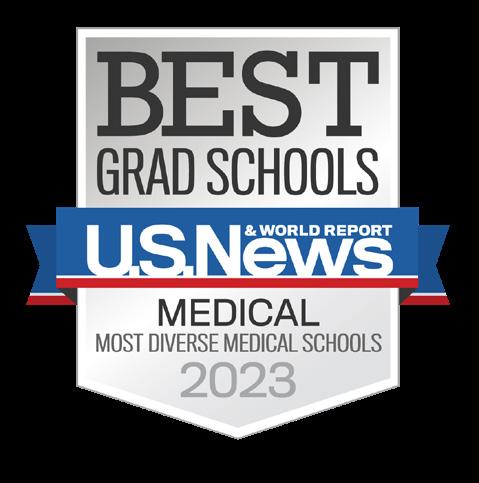

FAU High School is a public, dual enrollment high school providing accelerated pre-collegiate program with students working toward a cost-free bachelor’s degree from FAU and a high school diploma simultaneously. It paves the way for students to graduate college debt-free. Enhancing student development, FAU High School promotes early exposure to the hard sciences and opens doors to research and hands-on discovery.
Funded through education and health-focused nonprofit organizations, FAU’s College of Medicine’s pathway programs annually engage more than 500 students in grades 6 through 12 in collaboration with Palm Beach County schools. The curriculum includes biological science, career exploration, clinical exposure, college preparedness, financial literacy, mentoring, professional development and research exposure. Structured activities provide young learners with personalized attention to succeed. To optimize health outcomes for all populations, the college’s pathway programs recruit and retain students who are first-generation, from low-income families, or have otherwise been historically underrepresented in medicine to nurture a healthcare and biomedical research workforce that reflects the region’s diversity.
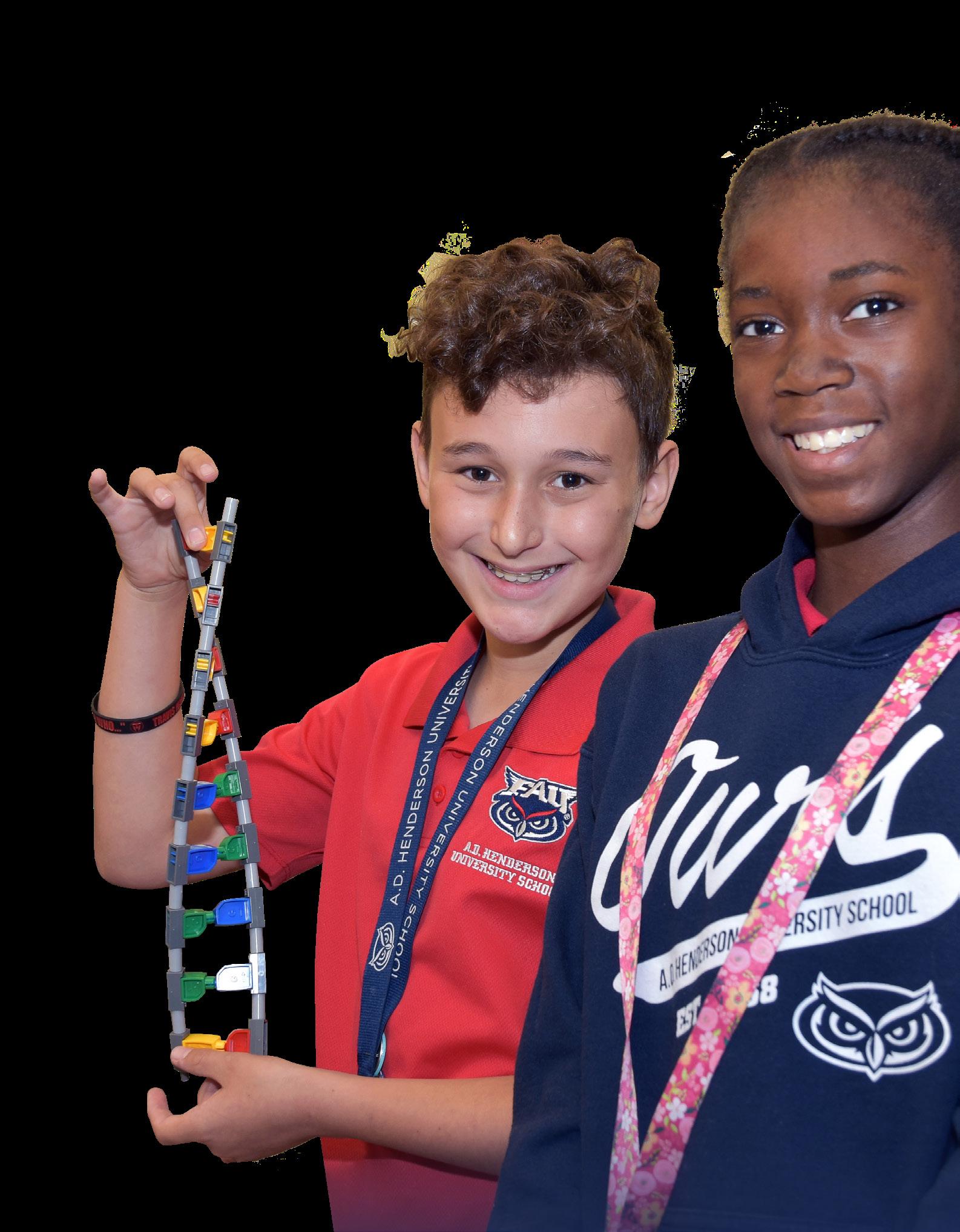
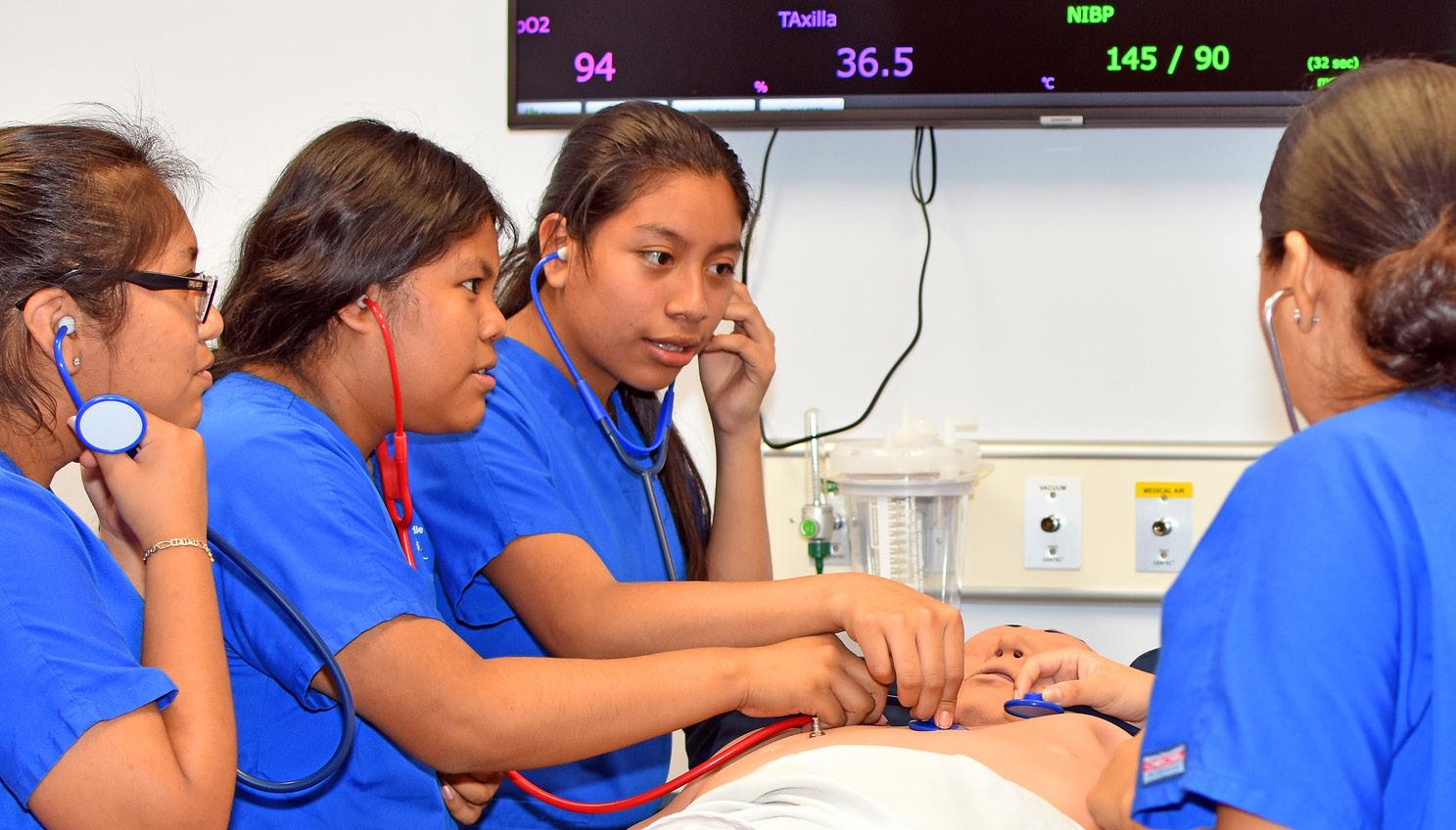
As a medical school of the community, for the community, the Schmidt College of Medicine is transforming health care in the regions it serves. Accordingly, the college collaborates with community leaders and educators to build educational enrichment programs that engage learners in clinical medicine, biomedical research and healthcare professions. On FAU’s campus, exposure to STEM starts early. Most recently, FAU partnered with the Bezos Academy to open a tuition-free, Montessori-inspired preschool for low-income families. FAU is the first university in Florida and the second in the United States to host the academy.
“It is fitting that we are the first state university in Florida to host the Bezos Academy since it directly aligns with FAU’s long history of providing the entire community access to an excellent education,” said Joel Herbst, Ed.D., superintendent and assistant dean, FAU PK-12 Schools. “FAU’s A.D. Henderson University School is a choice Title 1 school district that proves children from all economic backgrounds can excel if given the opportunity.”
For students pursuing an associate degree, Palm Beach State College is located on FAU’s Boca Raton campus, a 10-minute walk from the College of Medicine. Alternatively, students seeking a four-year degree may attend FAU. Currently, 40 percent of FAU students are Pell-eligible. The graduation rate for Pell-eligible students at FAU is ranked No. 19 in the nation by the U.S. News & World Report.


After completing a bachelor’s degree, students may apply to the College of Medicine or enroll in a master’s program in biomedical science, and/or a post-baccalaureate degree program. As students matriculate, the college partners with FAU’s American Medical Student Association, FAU’s Student National Medical Association, and other studentoriented health profession organizations to ensure continuity of support. Additionally, medical students connect with community partners through the Foundations of Medicine Service-Learning Program Curriculum. Students volunteer with the college’s pathway programs and participate in medical school preparation sessions with college leaders, ‘paying it forward’ as the next generation of healthcare professionals are empowered to serve the community.

The college recently established a guardian program consisting of faculty, student, resident and staff representatives who serve as the advisory council for the Chief Diversity and Inclusion Officer and Dean. The College of Medicine nurtures local networks through active listening and community-focused collaborations that address the needs of South Florida.
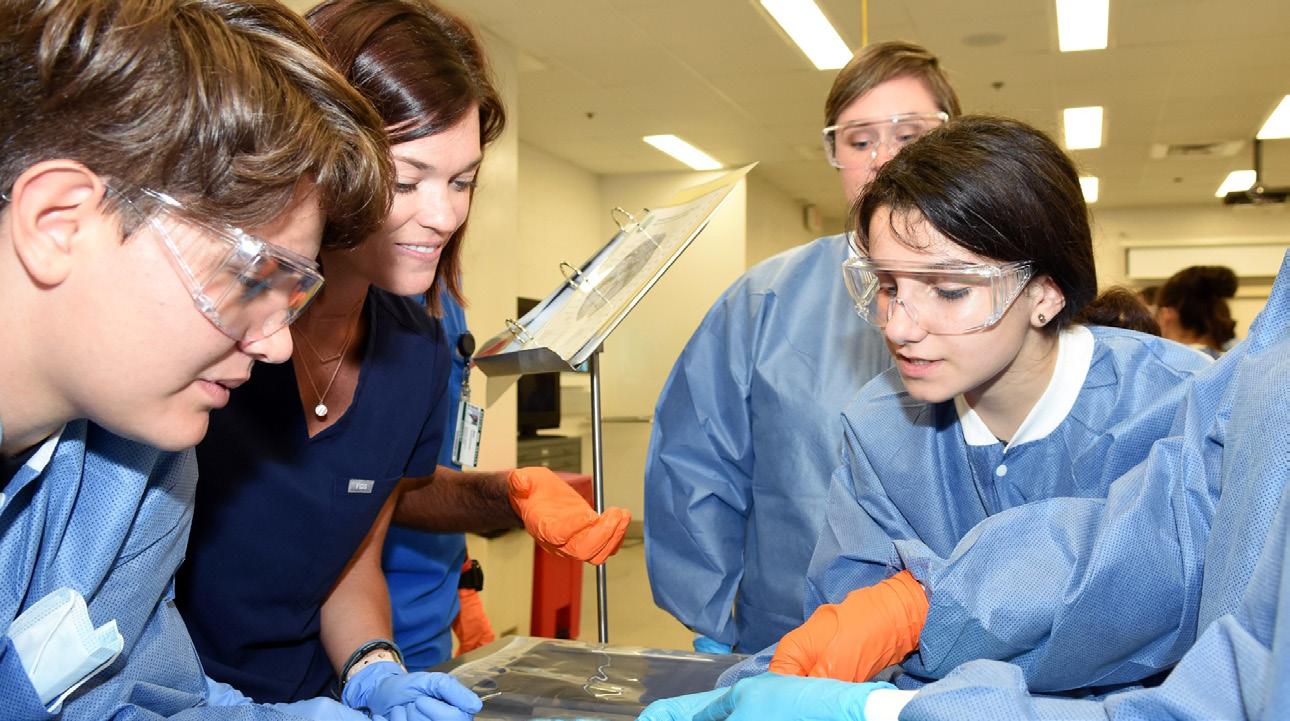
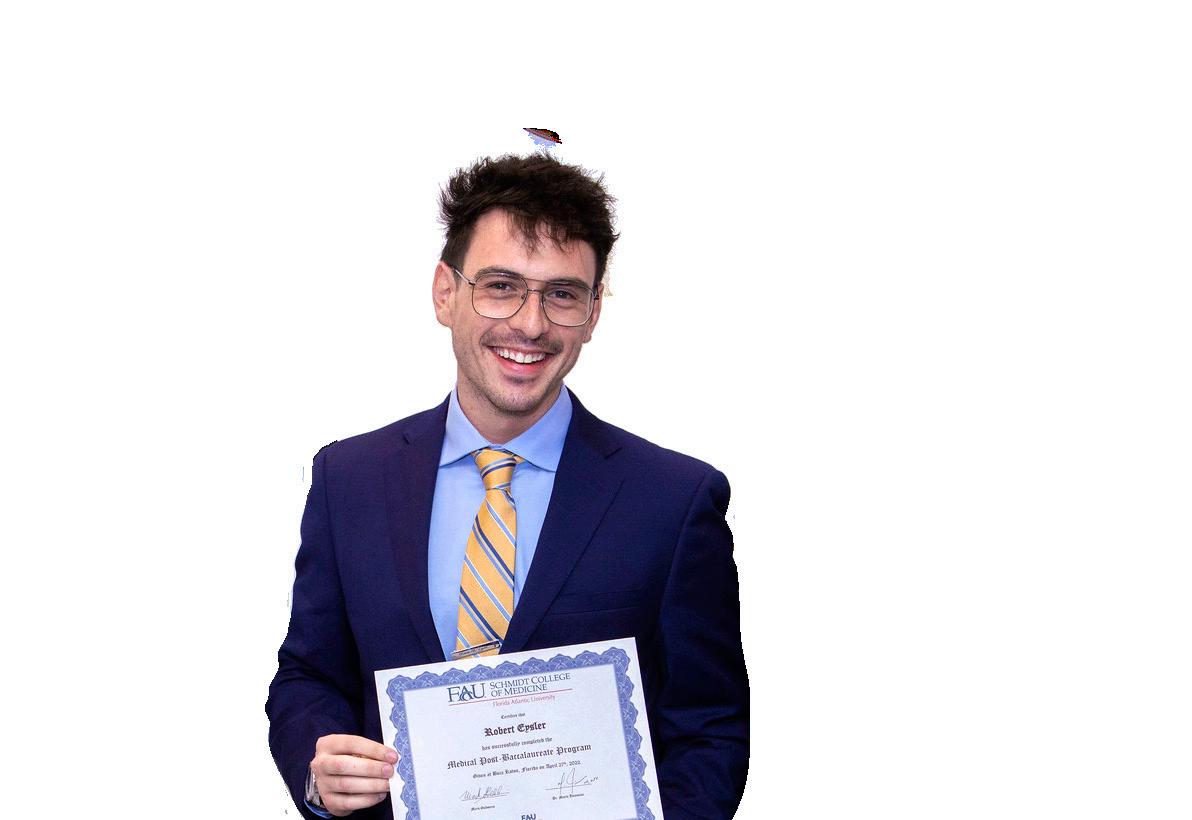
The Medical Post-Baccalaureate program (PostBAC) welcomed its inaugural class of seven students in 2020, who completed course requirements in less than a year. An immediate success, 100 percent of the inaugural class who applied to allopathic and osteopathic medical schools were accepted into their choice programs. Applicant numbers have quadrupled since its inception and plans are in place to further expand the program to accommodate growing demand from students who want to enter medical school and the biomedical fields.
The program is led by College of Medicine faculty who possess extensive experience with medical school admissions and the agility to address the needs of individual students. Through innovative courseware, students complete graduatelevel coursework in immunology, microbiology, pathology, morphology and advanced research techniques with learning objectives that parallel courses taught at FAU’s College of Medicine. The personal and professional skills training these students receive, reinforces their confidence.
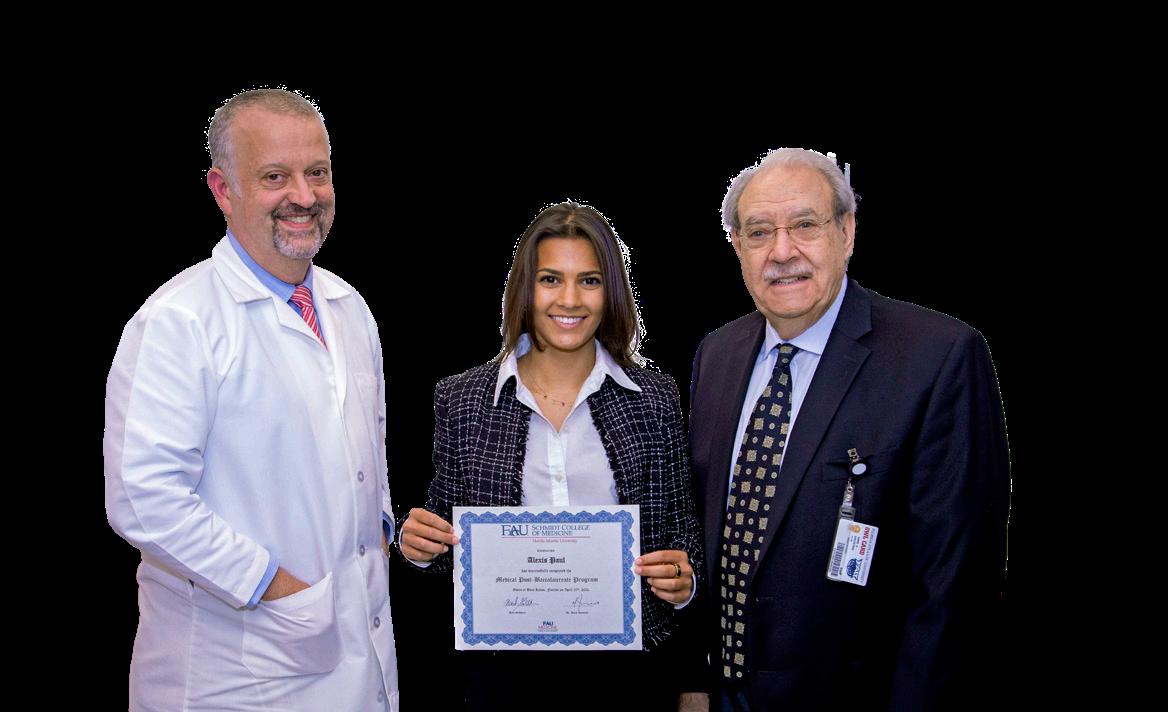
FAU’s PostBAC keenly focuses on collaborating with a broad spectrum of agencies to provide students with a wide range of volunteer opportunities that serve the needs of the community. Accordingly, hands-on participation broadens students’ community involvement with patients facing homelessness, food insecurity, drug addiction and alcoholism, post-traumatic stress disorder and other challenges. PostBAC students are also introduced to clinical research. Cleveland Clinic Florida, (CCF) Weston provides mentors for students and offers a vast field of research opportunities.
With its quickly expanding program, FAU’s PostBAC is unique in its complementary approaches to medicine, which develop patient empathy through community service modules, and rigorous coursework that supports clinical experiences.
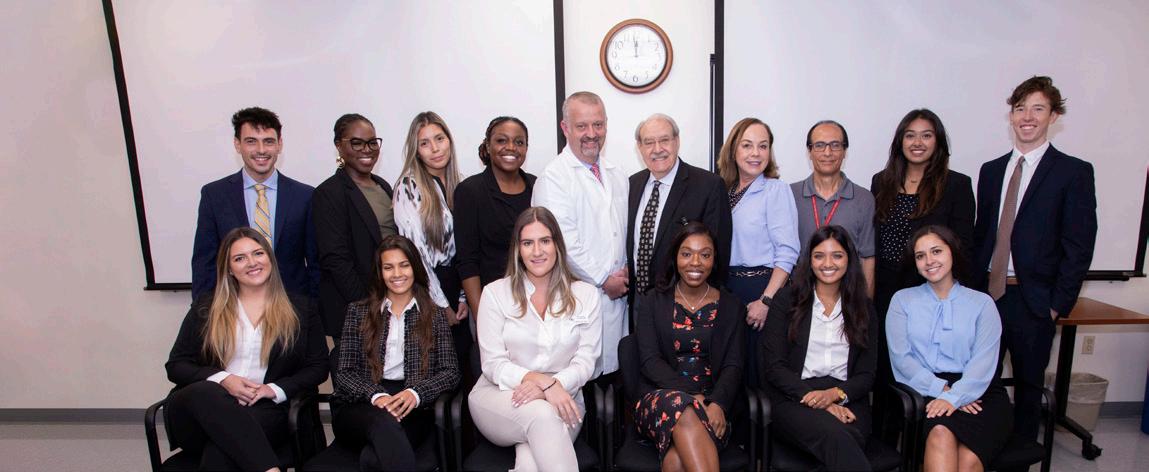
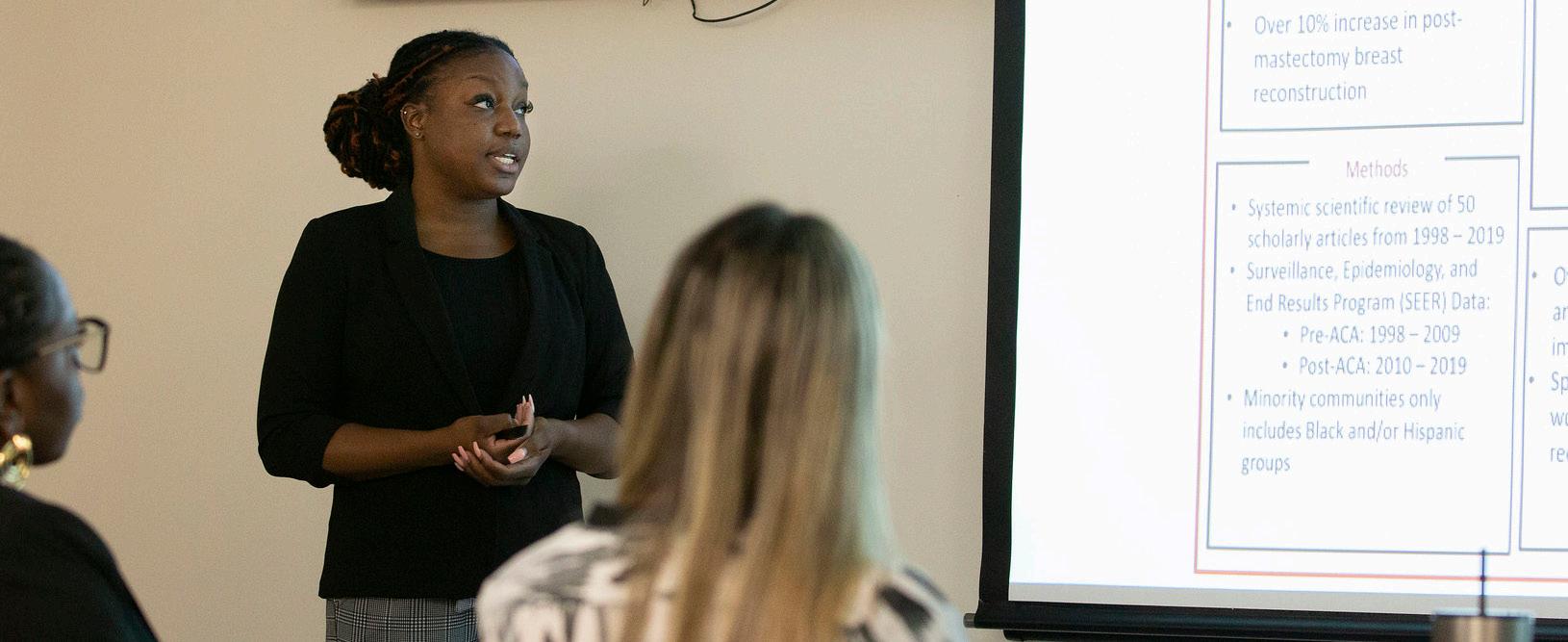
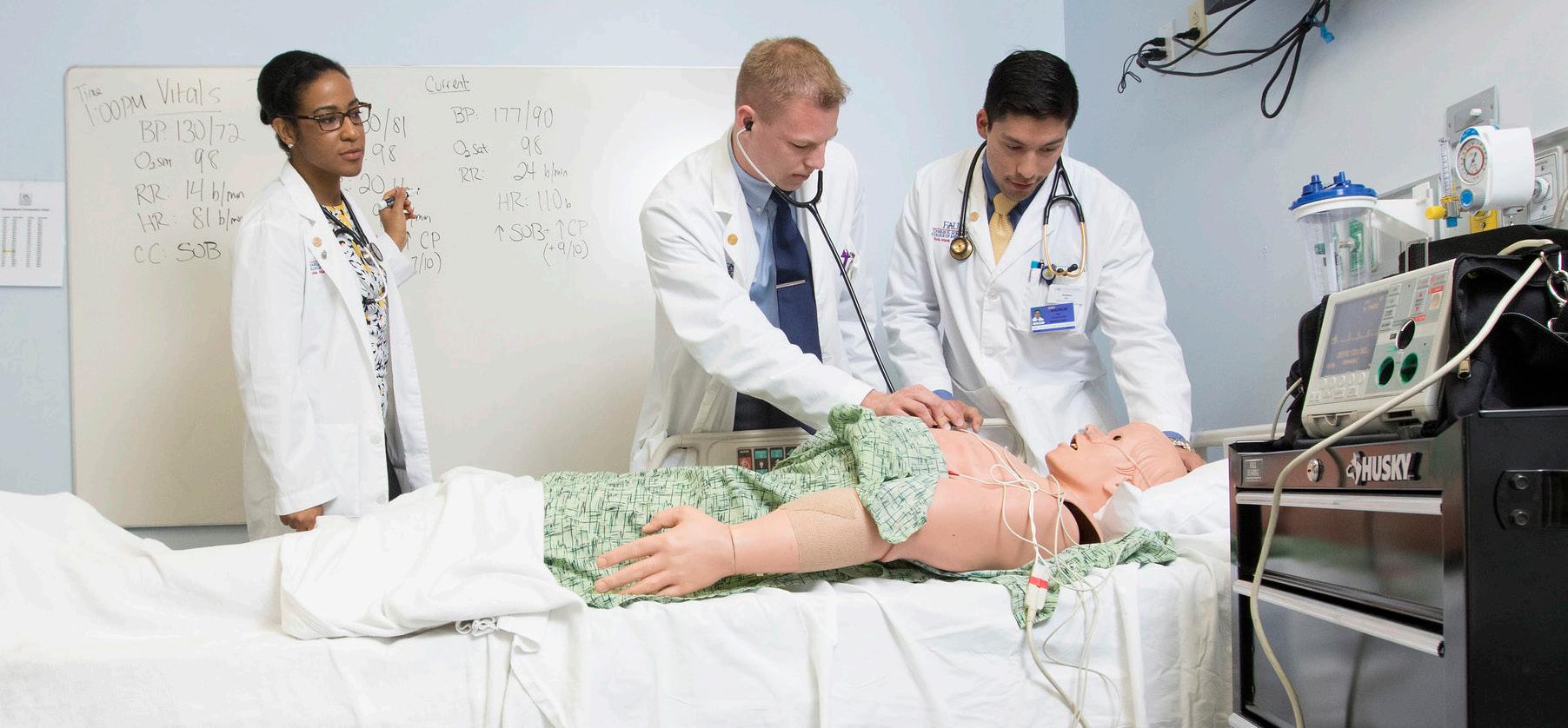
The College of Medicine’s Clinical Skills Simulation Center (CSSC) provides state-of-the-art simulation experiences. Using realistic training environments and standardized patients, the CSSC provides training to medical students, residents, registered nurses, nursing students and emergency response healthcare providers. More than 350 unique and customizable simulation scenarios have been developed, each requiring novel responses. These scenarios help develop acumen to improve critical thinking, real-time communication, teamwork and collaboration and the skills to address urgent and emergent issues.
Since its inception in 2006, the CSSC has trained more than 10,000 practicing nurses from more than 15 area hospitals. FAU’s general surgery, internal medicine, and emergency medicine residents also train at the CSSC. Skill development focuses on critical decision making; high acuity, low opportunity procedures and presentations; and crisis resource management and disaster response. FAU’s residents gain effective leadership and communication strategies. As educational needs change, the simulation modality evolves. For example, simulation training through virtual reality, augmented reality, mobile healthcare, telehealth, and numerous other emerging residency training requirements will propel the implementation of new technologies.
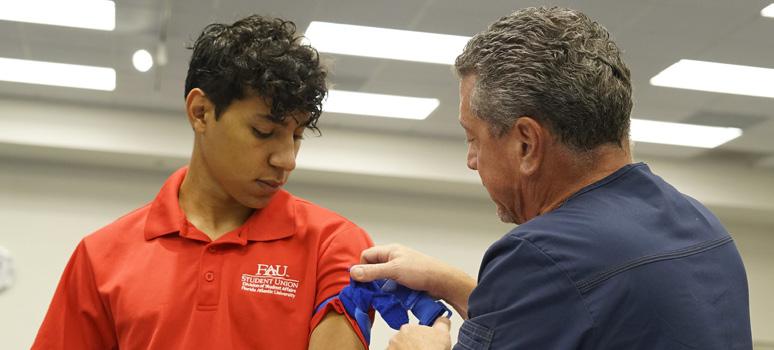
The CSSC has also become the center of community-based training by establishing certification programs including: Advanced Cardiac Life Support (ACLS); Advanced Trauma Life Support (ATLS); Pediatric Advanced Life Support (PALS); and Basic Life Support (BLS). Additionally, the CSSC has hosted emergency programs such as “Stop the Bleed” training for the local community.
As part of a commitment to serving the community’s healthcare needs, the CSSC maintains interprofessional collaborations. Working with FAU’s Christine E. Lynn College of Nursing, the CSSC enhanced telehealth training and team training activities. The CSSC also contracts with fire and rescue companies, county healthcare districts, and private practitioners to train staff and re-certify professionals. To aid in the reduction of healthcare worker shortages, the CSSC has prepared more than 200 international nurses for placement into hospitals in the United States through a collaboration with organizations specializing in the relocation and training of international nurses.
Additionally, the CSSC collaborates with adult living facilities in South Florida to train licensed practical nurses, certified nursing assistants, home health aides and care coordinators. Training focuses on improving medical and assessment skills and has served as a model for the Interventions to Reduce Acute Care Transfers (INTERACT) project and for the Medical Society of Palm Beach. By simulating real-life experiences using advanced technology, high-fidelity mannequins, standardized patients and equipment, the CSSC comprehensively improves healthcare training in the community it serves.
The “HealthFirst” health and wellness initiative at the Schmidt College of Medicine promotes an evidence-based, wellness-centered, holistic approach to education through curricular innovations, hands-on experiences and community engagement. The initiative integrates wellness under the pillars of exercise, nutrition and stress-management. Since its 2016 inception, programming has targeted curriculum, culture and community.
Recognizing that wellness is sustained through engagement, HealthFirst facilitates practices for the entire community, including “Wellness in Medicine” lectures on nutrition and culinary medicine; meditation and cognitive behavioral modification; and exercise and stress management. Healthfirst also interfaces with FAU’s Recreation Center and the Marcus Institute of Integrative Health to provide additional free classes. Additionally, the college’s medical students created the “Student Wellness Association” to facilitate peer-led activities, coordinated by Michelle Lizotte-Waniewski, Ph.D., director of HealthFirst.
HealthFirst also maintains community partnerships with the Palm Beach County Medical Society, community hospitals and nonprofit organization, “Peaceful Mind, Peaceful Life.” Healthfirst participates in community fitness and fundraising events such as the “PurpleStride 5K for Pancreatic Cancer” and the “Community Spirit Race.” Throughout the year, the college hosts panel discussions with practicing residents and physicians to discuss strategies for maintaining wellness while managing clinical schedules and personal responsibilities.
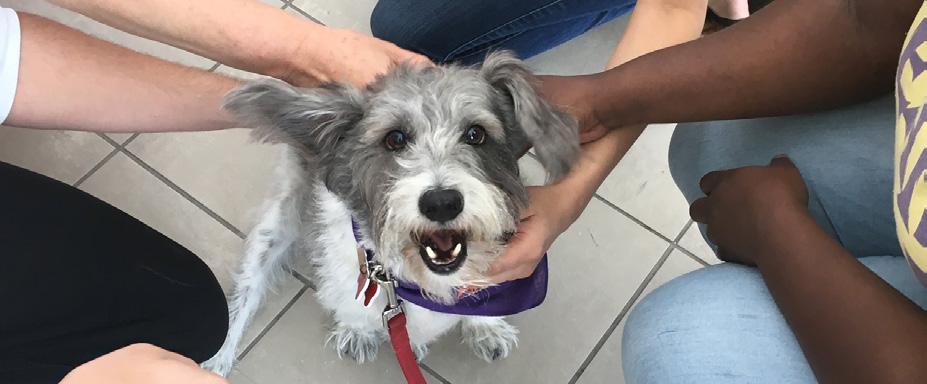

The scope of the HealthFirst initiative has expanded beyond the local community, achieving a national reach through the American Association of Medical Colleges (AAMC) news channels. Dr. Lizotte-Waniewski currently serves as an elected member of the AAMC Group on Student Affairs, subcommittee for Medical Student Wellbeing. Through this national forum, Dr. Lizotte-Waniewski’s leadership has contributed to the wellbeing of medical students across the country to aid in centralizing best practices from all medical schools and to make these wellness resources available under the auspices of the AAMC.

“PHYSICIAN HEAL THYSELF” Leading the Way for Wellness Nationally Through the AAMC
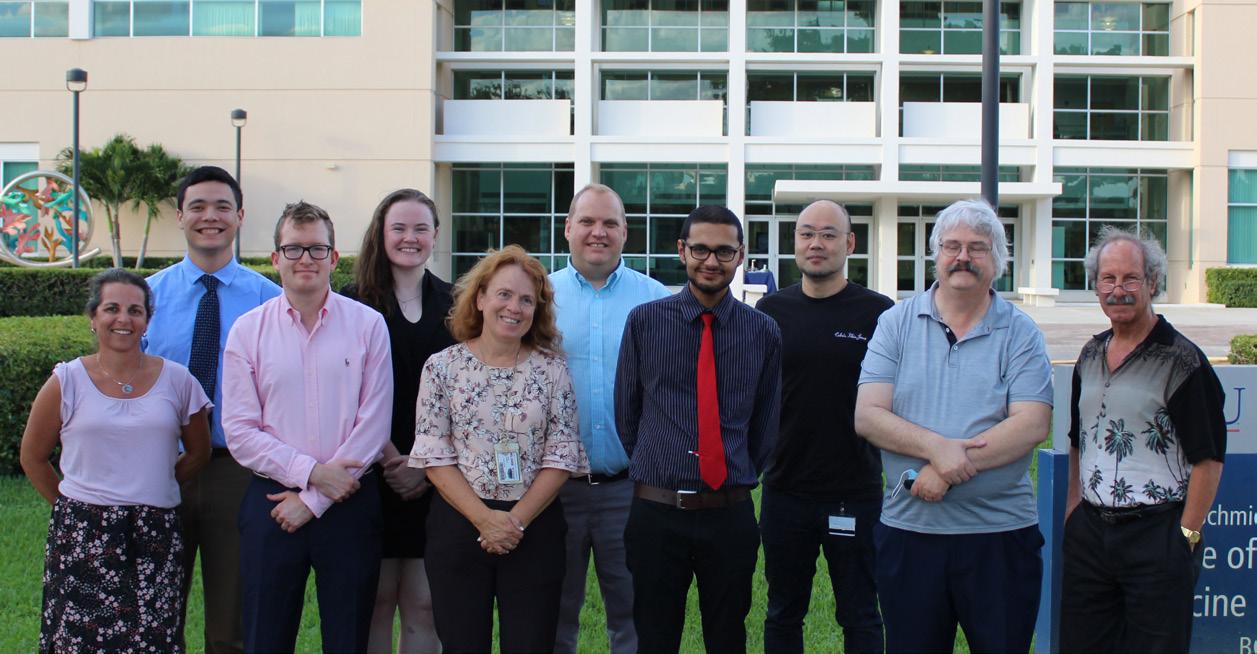
With an emphasis on teamwork and collaboration, the college is dedicated to addressing the needs of its community. An integrated curriculum stresses essential science in the context of patient care, case studies and clinical skills. Students receive early exposure to patients, rotating through inpatient and outpatient experiences. Additionally, longitudinal integrated clerkships encourage students to work with local organizations, nonprofits and public schools. Students also participate in service-learning projects, including local health fairs, food drives and community outreach programs.
This year, medical school applications increased 62 percent with 91 applicants for each spot and 100 percent of the Class of 2022 placed into residencies. Top programs include: Northwestern McGaw/Lurie Children’s; Emory University School of Medicine; Massachusetts General Hospital; New York Presbyterian/Columbia University Medical Center; University of Chicago Medical Center; University of Michigan Hospital - Ann Arbor; and UCLA Medical Center. The College of Medicine also launched a Research Distinction Track and a Graduate Certificate in Genomics and Predictive Health.
The college offers M.D./Ph.D., M.D./M.B.A., and M.D./ M.H.A., dual degree programs as well as an M.S. degree in biomedical science and a Ph.D. in integrative biology in collaboration with FAU’s Charles E. Schmidt College of Science, The Scripps Research Institute, Florida and the Max Planck Florida Institute for Neuroscience. A new Research Distinction Track offers a parallel curriculum for medical students. Additionally, a Genomics and Predictive Health Certificate prepares students for careers in personalized medicine, biotechnology and population health.
The M.S. program boasts a two-year graduation rate of 100 percent, with 36 percent of degrees awarded to historically underrepresented biomedical science students. Additionally, the program’s one-year retention rate is 88 percent and during the past six years, enrollment has increased by 62 percent.
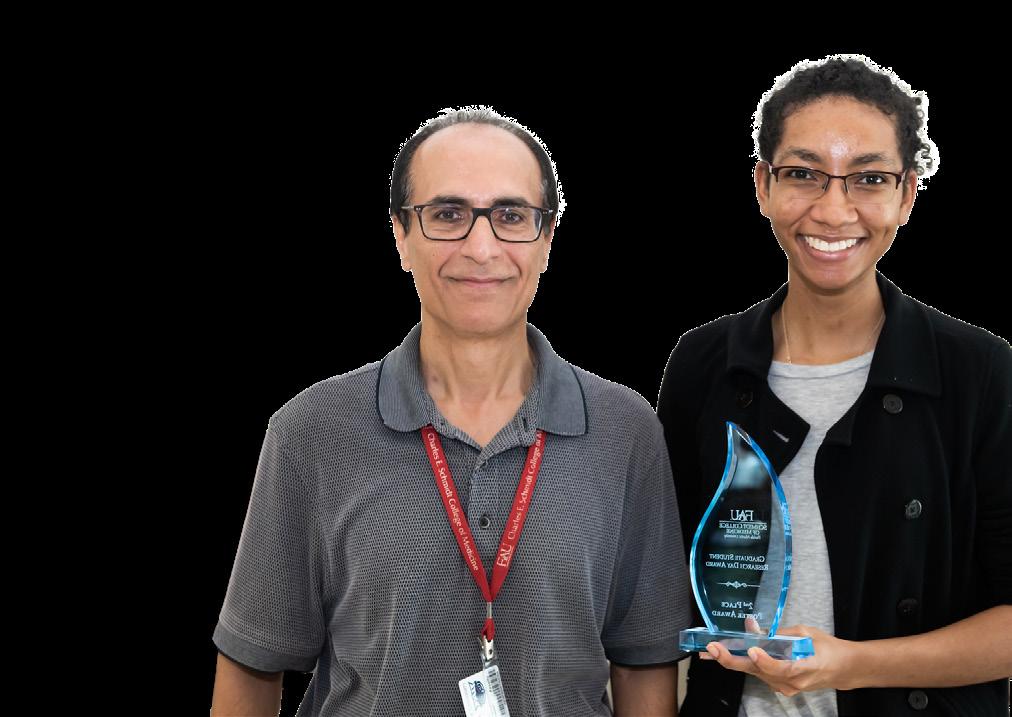
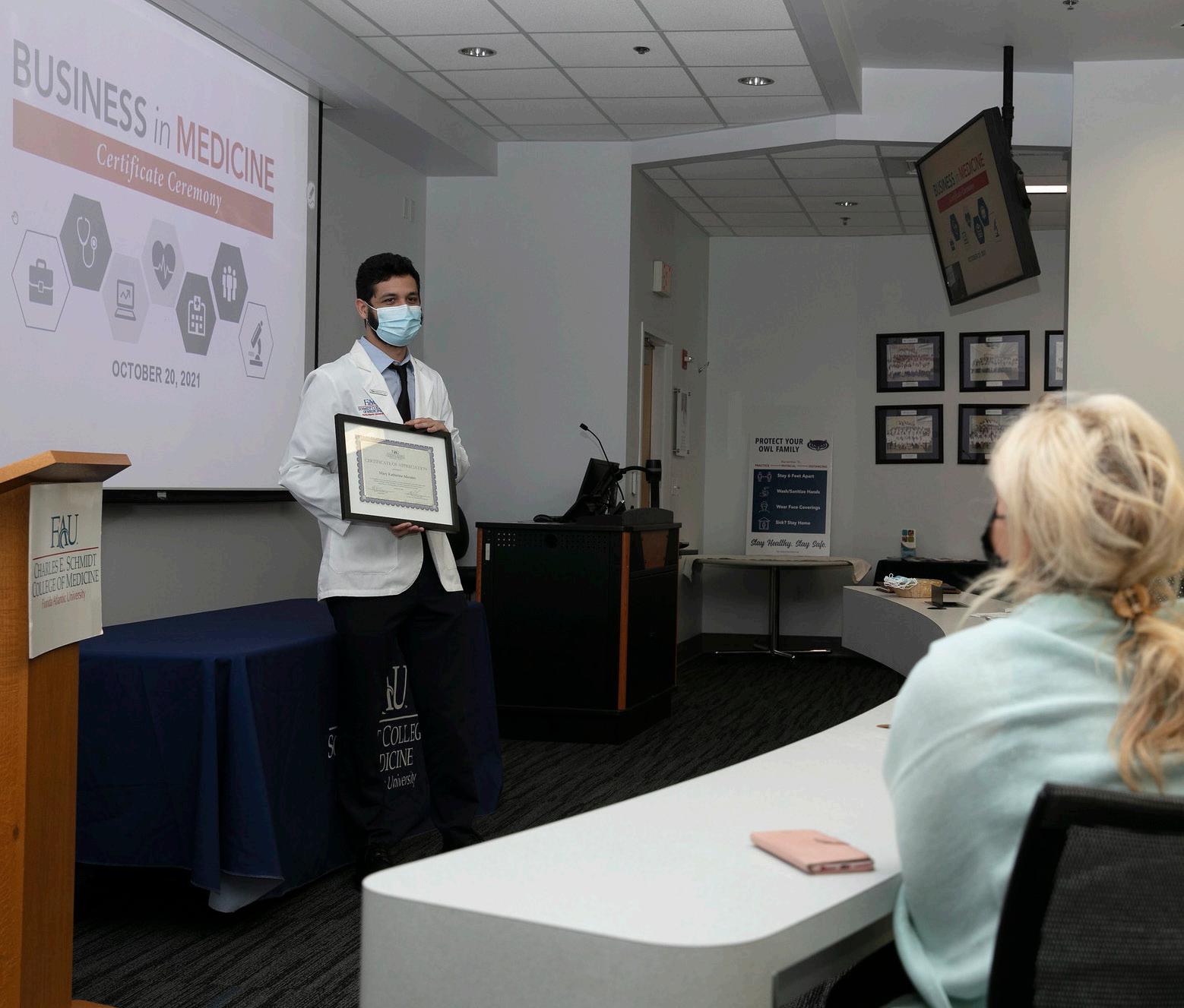
Also aimed at addressing physician shortages, FAU’s Consortium for Graduate Medical Education (GME) was formed in 2011 with five leading hospitals in Palm Beach County. The Accreditation Council for Graduate Medical Education (ACGME) has accredited FAU’s GME residencies for internal medicine, surgery, emergency medicine, psychiatry, and neurology. The college also offers fellowship programs in cardiovascular disease, geriatric medicine, hospice and palliative care and vascular surgery. FAU’s residents consistently place into outstanding clinical care opportunities and 50 percent of graduating residents remain in Florida.
Committed to interprofessional education and critical thinking, medical students and scientists are prepared to meet the challenges of healthcare delivery, as the college boldly advances the health and wellbeing of the community.
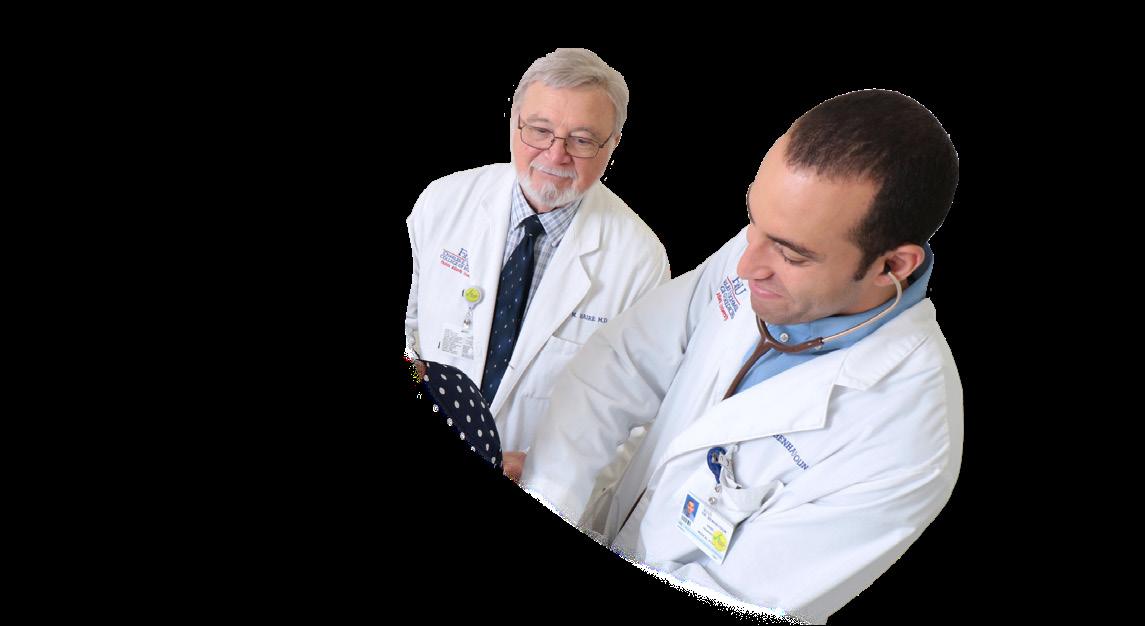
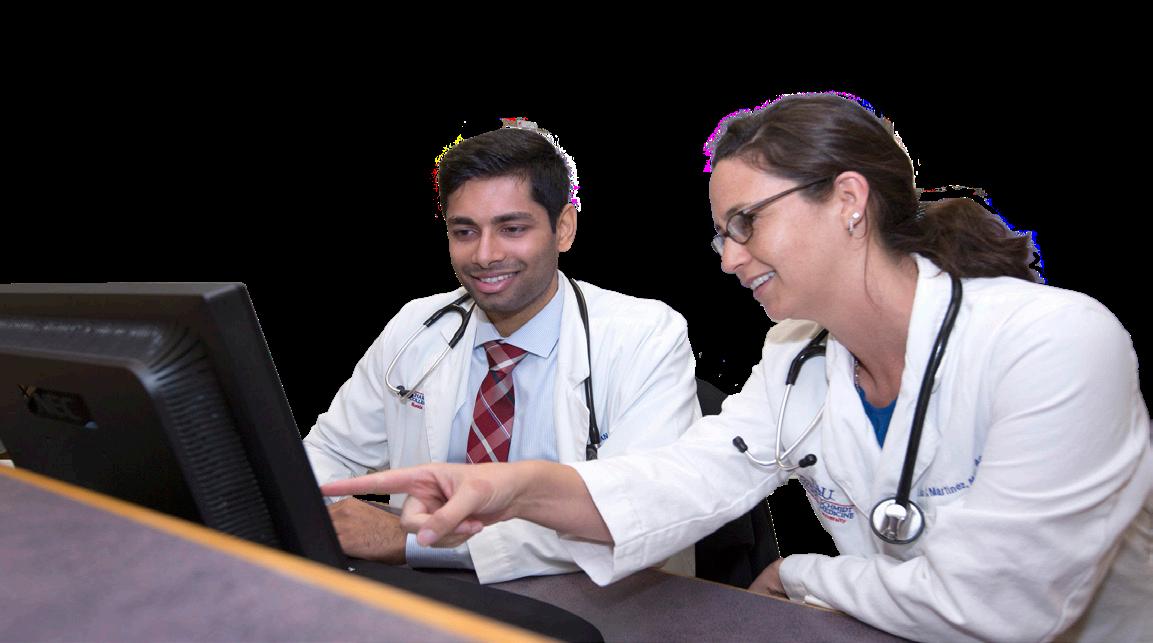
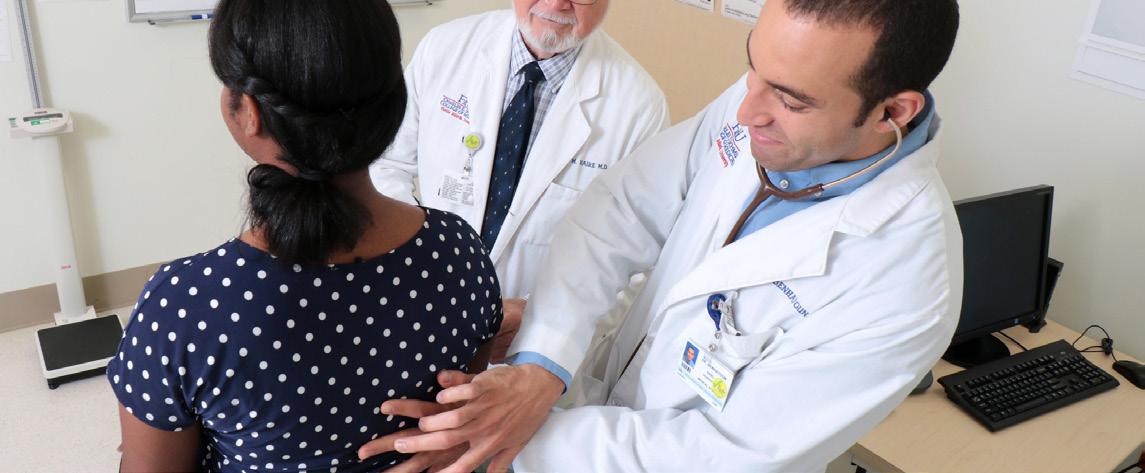
Medical school graduates committed to helping Florida’s underserved and diverse community choose FAU’s internal medicine residency program. At the core of this three-year program is the FAU Medicine Resident Clinic, a state-ofthe-art outpatient facility housed near Boca Raton Regional Hospital, part of Baptist Health. The clinic serves patients with limited access to medical care due to limited or no insurance. Patients are treated by internal medicine residents and are supervised by experienced faculty, board-certified in internal medicine. FAU residents provide the full spectrum of internal medicine services. Emphasis is placed on continuity of relationships that decrease barriers to access and optimize transitions in care.
“Because our patients represent many diverse populations, the FAU Medicine Resident Clinic is committed to creating a healthcare workforce that reflects and is responsive to the communities we serve,” said Henry M. Haire, M.D., FACP, the inaugural medical director of the FAU Medicine Resident Clinic and an associate professor in the Schmidt College of Medicine. “The work we do at our clinic is a vital mission for a significant number of our medical students, residents and faculty members.”
Advocacy and quality patient care are also core to the curriculum at the medical school. Beginning in the first semester, students observe barriers for patients to access quality care. The college’s partnership with Caridad Center in Boynton Beach and Mission Medical Clinic in Delray Beach allows students to participate in patient care. These experiences inspired FAU medical students to create a student-led initiative at the Caridad Center on Saturday mornings.
“By providing our students with the opportunity to see what barriers many of our patients face, we are creating the next generation of physicians who will understand the system and have the drive to implement positive changes in their communities,” said Lisa Martinez, M.D., an assistant professor in the Department of Medicine. “They have already shown that drive by volunteering their time from busy schedules to ensure that patients who work receive high quality care on weekends when it is easier for them to be seen.”
The Caridad Center is the largest free clinic in Florida and one of the largest in the country in terms of patients served. The FAU care team works tirelessly to ensure that the poor, uninsured and underserved individuals and families of Palm Beach County receive life-changing healthcare, education and outreach programs.
“We care deeply about the life experiences of our patients and the social determinants of health that impact every aspect of their lives,” said Dr. Haire. “By connecting with our community, our residents and students will be able to provide superior care, learn with great enthusiasm and become successful as physicians, leaders, advocates, teachers, mentors and friends.”
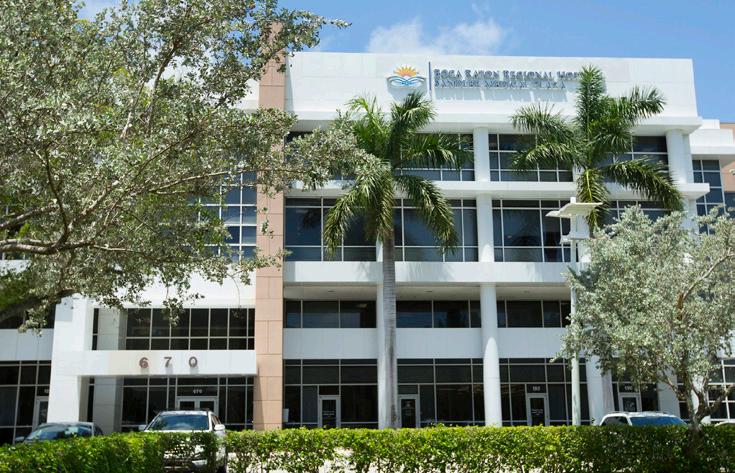
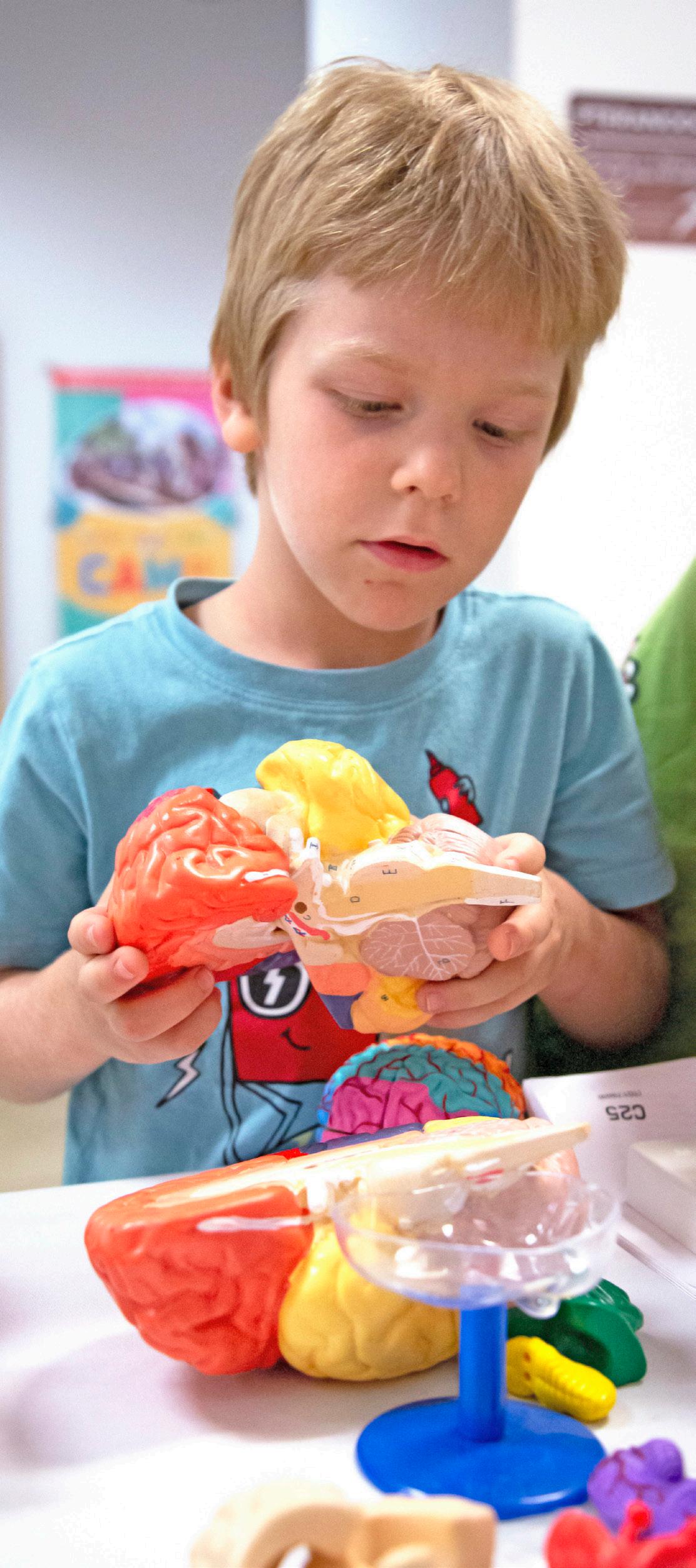
According to the U.S. National Report Card, K-12 students who attend high-poverty schools are least likely to have access to science, technology, engineering and math (STEM) courses and opportunities. To increase educational resources, local business leader and health-science advocate, David J. S. Nicholson, funded the FAU Stiles-Nicholson Brain Institute’s ASCEND (Advancing STEM Community Engagement through Neuroscience Discovery) program on FAU’s Jupiter Campus. ASCEND seeks to increase public awareness and understanding of contemporary brain science research activities and brain health; and to facilitate an increase of young minds who work in neuroscience-based disciplines.
ASCEND is a mentored program, comprised of direct and digital media-based interactions between neuroscience trainees at FAU, Max Planck Florida Institute for Neuroscience and Scripps Florida, which targets middle and high school students in Palm Beach County.
“The mission of ASCEND is to positively impact the national shortage of students pursuing STEM education and career-related opportunities through inspiring and intellectual, hands-on learning experiences between post-baccalaureate and post-doctoral neuroscience trainees and students in our community,” said Nicole Baganz, Ph.D., director of community engagement and programming at the Stiles-Nicholson Brain Institute, and director of ASCEND.
In 2022, the Stiles-Nicholson Brain Institute launched the Neuroscience Graduate Program (NGP) to attract and train the next generation of interdisciplinary brain scientists who will pursue new treatments and preventions of life-altering brain disorders. FAU’s NGP, one of only two comprehensive neuroscience graduate programs in Florida, combines broad didactic training with cutting-edge research experiences.
“The NGP is oriented to supplying the technically sophisticated brain science workforce of the future. If we build it right, our graduates will have outstanding opportunities to have successful, independent careers while they help make the world a much better place,” said Randy D. Blakely, Ph.D., executive director, FAU Stiles Nicholson Brain Institute, and a professor in the Department of Biomedical Science in the College of Medicine.
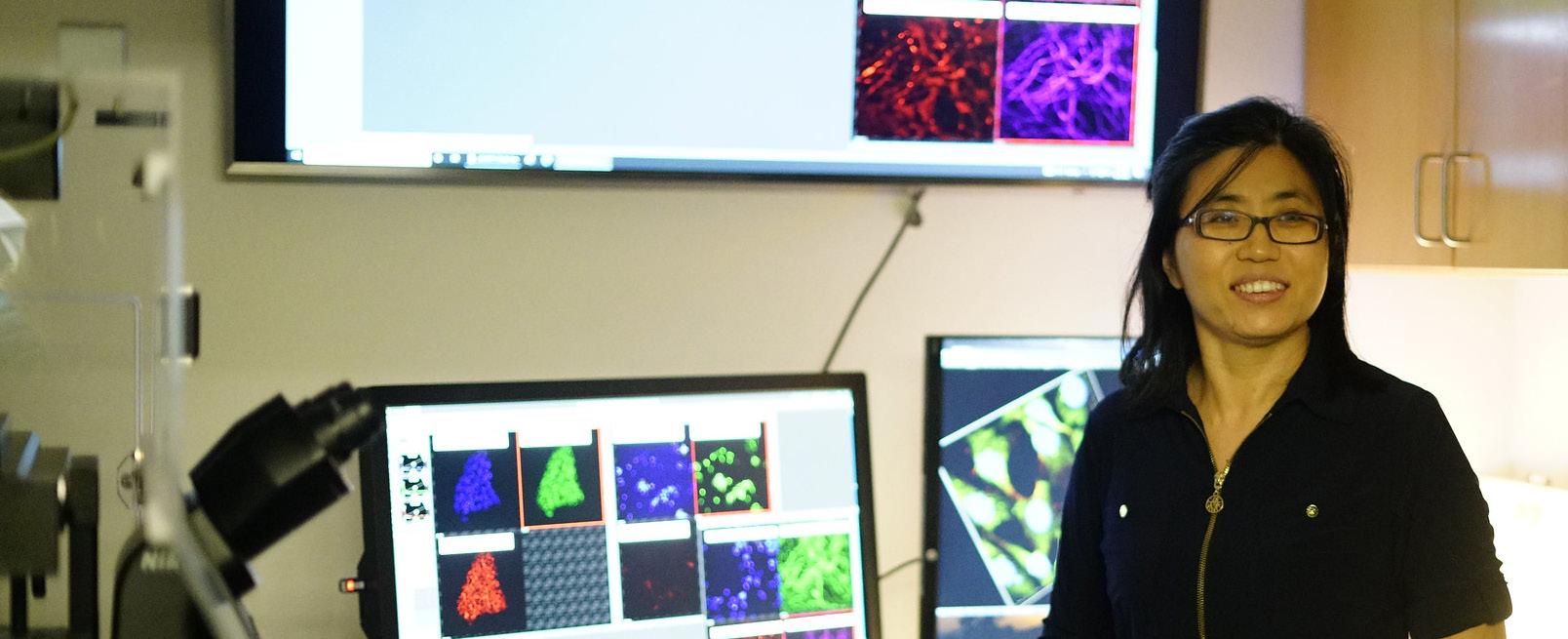
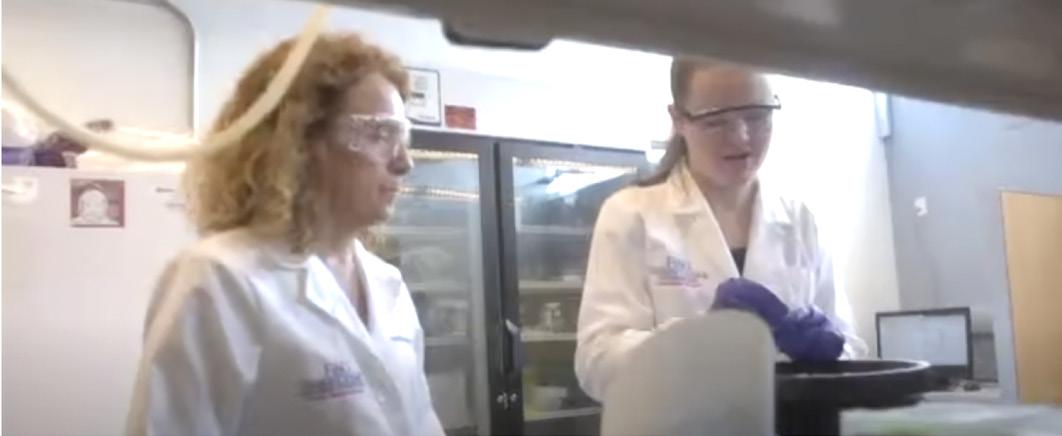
According to the U.S. Census Report, nearly one-quarter of Florida’s population is over age 65. To prepare health professionals for a rapidly aging population, the Schmidt College of Medicine is providing innovative geriatric training.
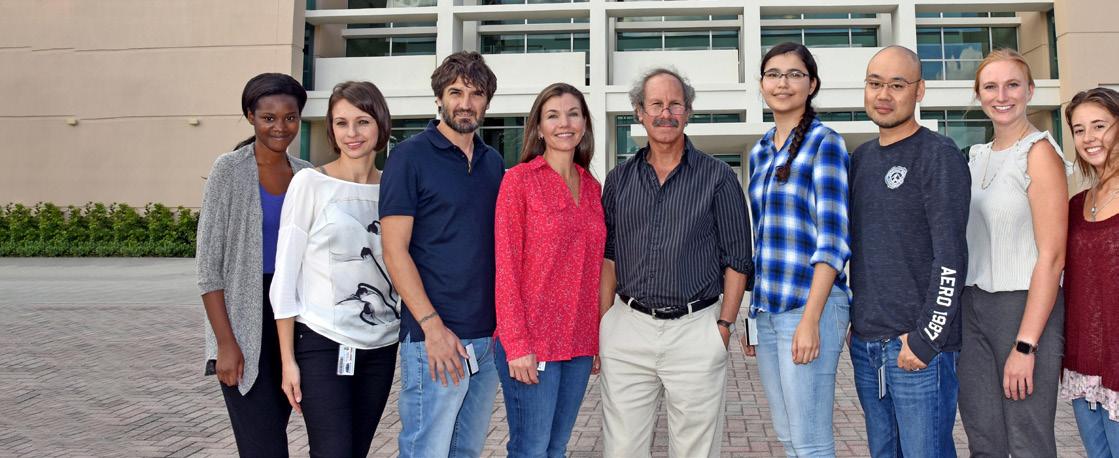
Among older adults, acute or chronic pain is the most frequently cited reason for seeking healthcare. In addition, several studies suggest the elderly are also more sensitive to deep muscular pain resulting from more dysfunctional pain processing mechanisms. Precision medicine can optimize pain relief by leveraging interdisciplinary expertise from research to clinical implementation. Further, precision medicine considers inherent differences in genes, lifestyle choices and environment, thereby allowing personalized, precise and effective pain management. The College of Medicine is leading the efforts in research on pain processing.
Developing innovative ways to treat pain requires understanding how it’s processed and perceived by the body. Lawrence Toll, Ph.D., professor and Akihiko Ozawa, Ph.D., research assistant professor in the Department of Biomedical Science, focus on pain management and drug addiction through pharmacology and new drug discovery. Dr. Toll’s research on opioid and the nociception opioid receptor (NOP), nicotinic acetylcholine receptors, and his discovery of the endogenous neuropeptide “nociception,” have identified novel drug targets.
Continuing use of opioids to treat moderate to severe pain also depends on identifying and assessing the addiction risk. Andrea Cippitelli, Ph.D., research associate professor in FAU’s Department of Biomedical Science, focuses on the management of substance use disorders through pharmacology and drug discovery. Dr. Cippitelli seeks to manage substance use disorders in collaboration with academic partners at FAU and drug development companies dedicated to development and commercialization of new therapies to treat psychostimulant, opioid, nicotine and alcohol use disorders.
Delivering personalized pain management at scale requires data-driven approaches to identify biomarkers for pain relief and opioid addiction risk. Leading these efforts is Janet Robishaw, Ph.D., senior associate dean for research and chair of the Department of Biomedical Science. Dr. Robishaw and colleagues from Geisinger Health System and the University of Pennsylvania assess clinical and genetic characteristics of a cohort of 25,000 patients suffering from chronic musculoskeletal pain who are receiving prescription opioids. The goals are to examine patients’ clinical characteristics to determine the cause of pain and how prescription opioids affect outcomes; and to identify the unique genetic signature of patients most susceptible to addiction.
Further, since 2017, Julie G. Pilitsis, M.D., Ph.D., M.B.A., dean and vice president of medical affairs, and Ilknur Telkes, Ph.D., M.Sc., assistant professor of biomedical science in the Schmidt College of Medicine, have combined research interests to address pain. They identified Parkinson’s Disease phenotypes using biomedical signals and fMRI correlates, exploring invasive and non-invasive neural signal characteristics, specifically obsessive-compulsive disorder. They have objectively assessed pain relief in response to spinal cord stimulation and developed classification algorithms to predict patient response to treatment. In addition, they developed intraoperative spinal motor mapping with neuropathic back/leg pain and intraoperative neurophysiological monitoring.
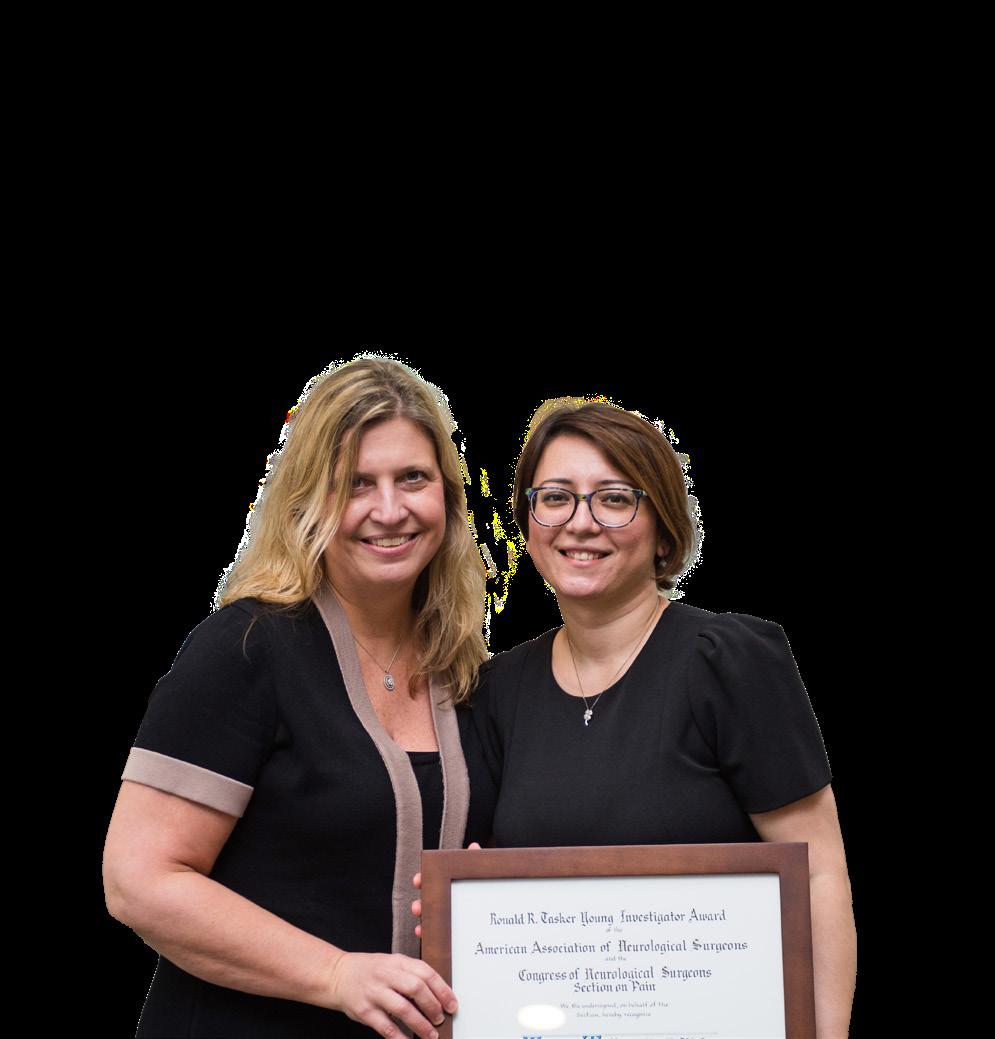
Dr. Pilitsis, a neuromodulation expert in functional neurosurgery and a successful physician-scientist, has worked to develop tools for treating neurological disorders throughout her career.
With expertise in electrophysiological data recording, Dr. Telkes applies neural engineering and biomedical signal processing techniques for neuromarker discovery and cultivates algorithms to improve clinical neuromodulation therapies. She develops quantified, neural signatures of pain relief using methods from diverse disciplines such as biomedical/electrical engineering, neurosurgery, neurology and neuroscience.
Drs. Pilitsis and Telkes published their most recent research on spinal cord stimulation in the journal Neurosurgery. The study is the first to use a high-resolution spinal cord stimulation electrode, which is newly FDA approved, and perform medio-lateral spinal motor mapping in patients with chronic pain.
The college is at the forefront, addressing the acute and chronic pain needs in the community using precision medicine. Faculty are bridging the gap in pain management care with interdisciplinary teams leveraging experts from pain processing and genetic variants to medication responses, multimodal therapies and the education of future physicians.
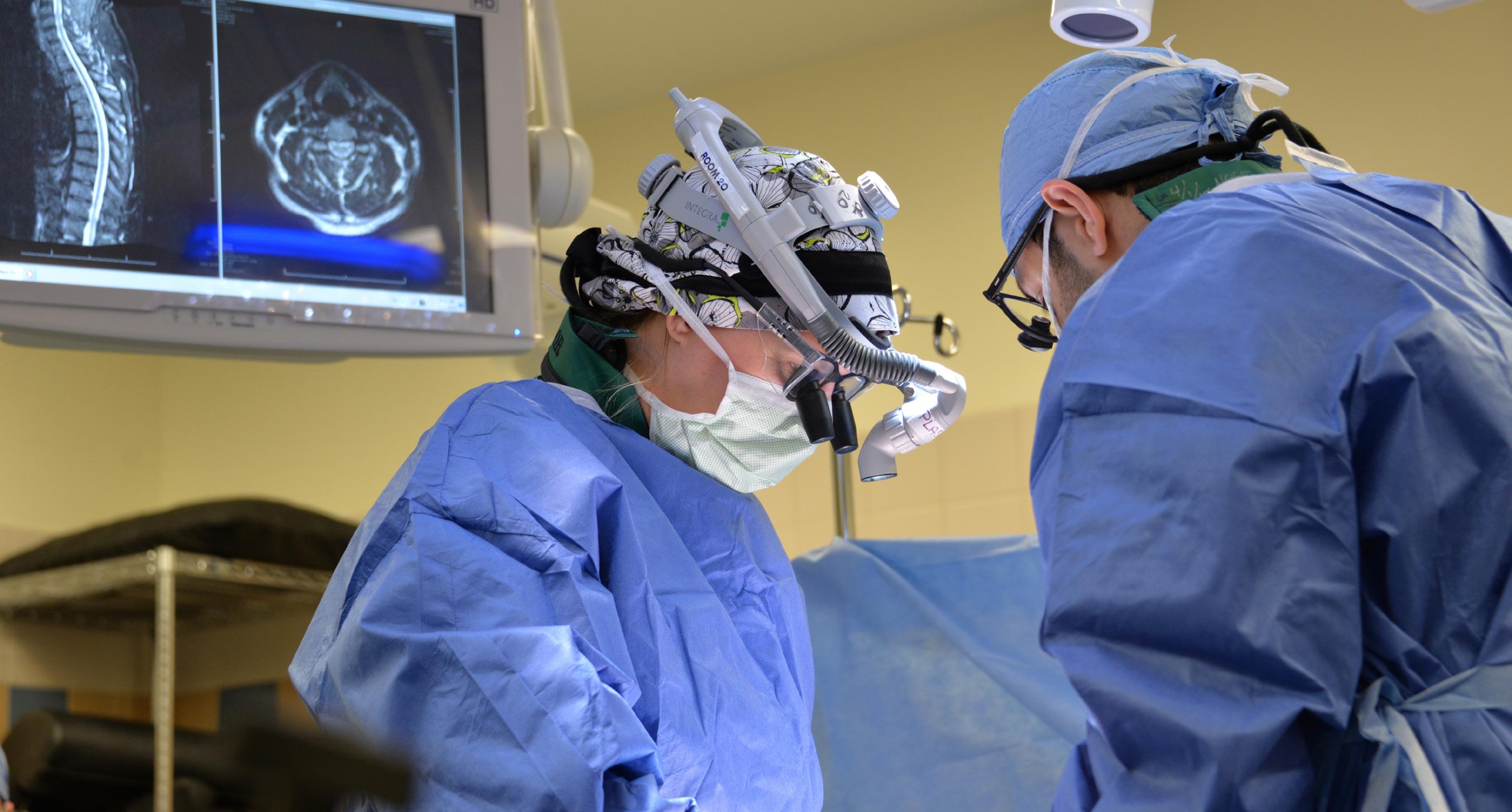
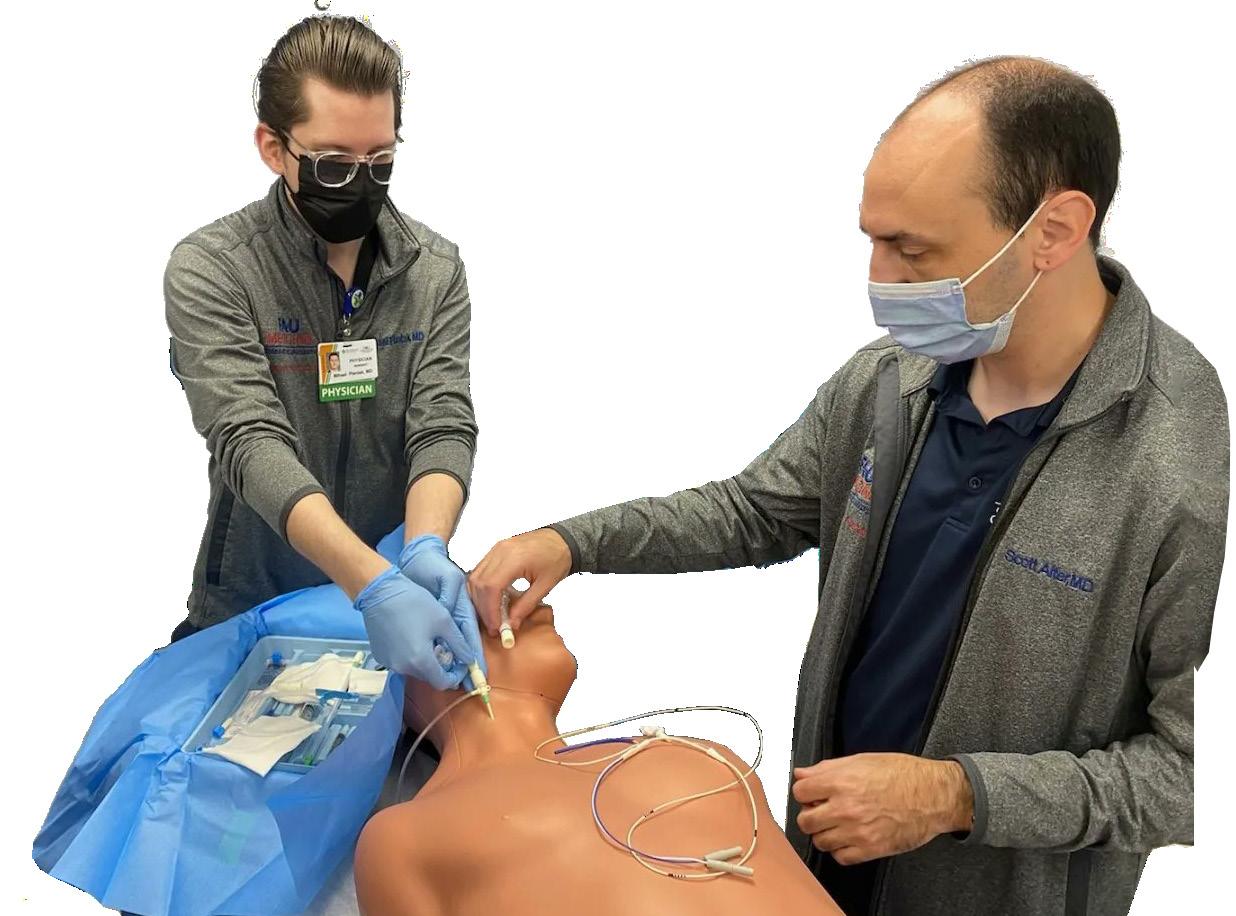
Florida has the highest percentage of geriatric residents in the United States. In particular, Palm Beach County has more than 250,000 residents older than 65, making it one of only 12 counties in the U.S. with this distinction. Older adults are at highest risk of suffering head injury due to falls and other forms of trauma. In addition, blood thinner use is known to significantly increase the incidence and severity of traumatic intracranial hemorrhage.
“The problem with head trauma is particularly worrisome, because these individuals are seen in the emergency department where there is an opportunity for intervention or even prevention of future head injuries to avoid future catastrophic intracranial hemorrhage,” said Scott Alter, M.D., M.B.A., an associate professor of emergency medicine and associate research director of the Emergency Medicine Residency Program in the Schmidt College of Medicine. “Research is therefore needed on specific patient characteristics such as risk factors, which would help identify these individuals in the emergency department on their initial presentation to afford an opportunity for prevention of this devastating patient safety problem.”
FAU researchers are working with hospital partners from Delray Medical Center and St. Mary’s Medical Center in Palm Beach County to implement “The Great Stop.” The observational study has been designed to examine the risk factors for acute and delayed intracranial hemorrhage in geriatric trauma patients. In addition, they will assess repeat emergency department visits, hospitalization and mortality.
“While many studies have sought to quantify the incidence of intracranial hemorrhage in these patients, there is considerable controversy regarding their care and what to do after an initial negative head CT scan in anticoagulated geriatric patients who have experienced head trauma,” said Dr. Alter. “To our knowledge, no study has prospectively followed geriatric patients to assess outcomes months after injury as we are doing with The Great Stop.” Data will help to design controlled trials to evaluate the best strategies for preventing primary and delayed intracranial hemorrhage and related morbidity in older adults. FAU investigators are Dr. Alter; Richard Shih, M.D., a professor of emergency medicine; Joshua Solano, M.D., an associate professor of emergency medicine; Patrick Hughes, D.O., an associate professor of emergency medicine; and Lisa Clayton, D.O., chair, FAU Department of Emergency Medicine.
The project was recently awarded a Dr. Alvin E. Smith Safety of Health Care Services grant for $1 million by the Florida Medical Malpractice Joint Underwriting Association. The 2022 grant for “The GREAT FALL” will replenish funding of the original grant awarded in 2019 and support the continuation of this important work.
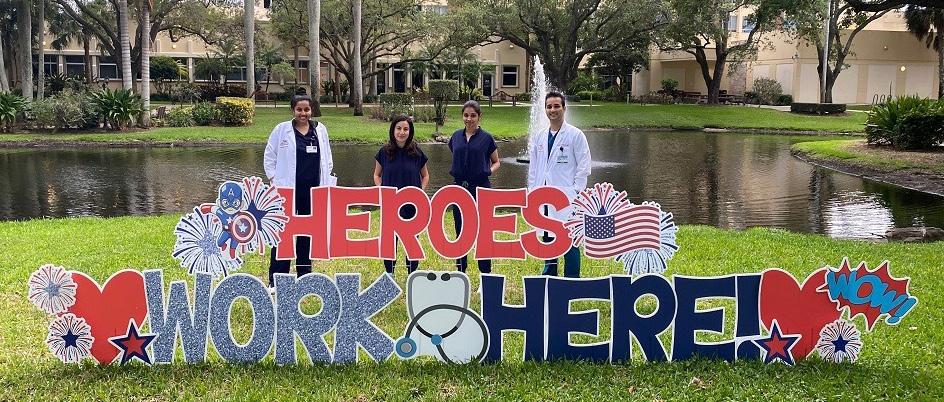
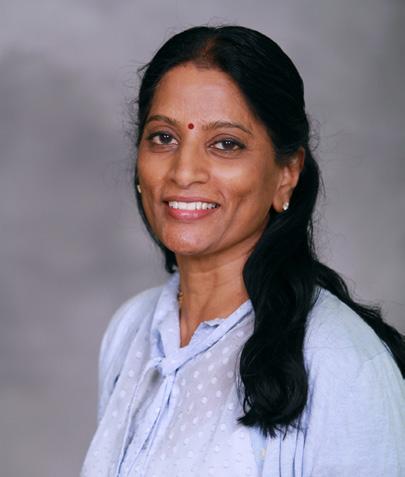
Chief resident for emergency medicine, Rebecca Mendelsohn, M.D., will join the prestigious NASA/University of Texas Medical Branch’s Aerospace Medicine program. This highly competitive, two-year program is the only civilian aerospace medicine training program in the country. Completion serves as the entry point to a career as a flight surgeon at NASA, a medical officer for the FAA, a medical director for commercial airline companies, or, as a medical team member of a commercial space company. To complete the program, Dr. Mendelsohn will earn an M.P.H. degree and become board-certified in occupational and preventative medicine and aerospace medicine.
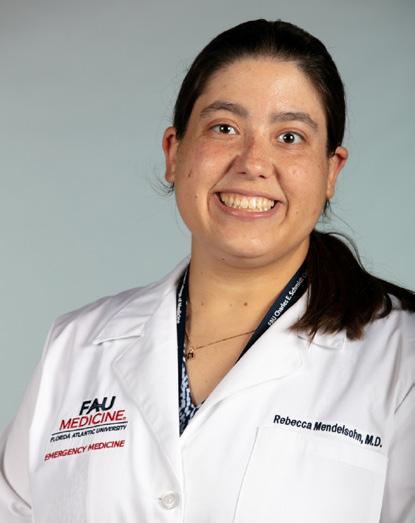
Florida Atlantic University hosted the 53rd annual Honors Convocation, recognizing the University’s most outstanding students and faculty members. This year, the most prestigious award “Distinguished Teacher of the Year” was given to Vijaya (VJ) Iragavarapu, Ph.D., a professor of biomedical science in the College of Medicine. As a founding member, Dr. VJ helped develop an innovative curriculum and directed the first-year medical student course, converting the curriculum of didactic and small group facilitations to an online format. She teaches immunology and the Harvard HMX program for immunology. Her research, focused on breast cancer and understanding metastasis, is consistently funded by the National Cancer Institute and the Bankhead-Coley Biomedical Research Program. Also honored was Nicole Baganz, Ph.D., assistant director for the FAU Stiles-Nicholson Brain Institute with dual roles in FAU’s Division of Research and the Schmidt College of Medicine. She received the Presidential Award for Engaged Faculty for her work in the ASCEND program. Ceylan Isgor, Ph.D., associate professor of biomedical science in the College of Medicine was selected as a finalist
for the Distinguished Mentor of the Year in Undergraduate Research – her mentee, Vanessa Stubbs, received the Undergraduate Researcher of the Year. Vanessa is a first-generation student, a first-generation immigrant from the Bahamas, and a non-traditional student, having spent several years as a licensed practical nurse.

Ning Quan, Ph.D., a professor of biomedical science, examines how the nervous system and immune system form a combined neuroimmune suprasystem and how these two systems communicate with each other to modulate each other’s function. His research uses multiple techniques in molecular biology, neuroscience and immunology to accomplish this goal. Dr. Quan’s current work led to the discovery of the euflammatory process, used primarily to inform immunotherapy techniques. He also identified several specific pathways related to the pathogenesis of various psychopathologies caused by inflammation within the central nervous system, which is associated with chronic neurodegenerative diseases including Alzheimer’s disease, Parkinson’s disease, and multiple sclerosis. Dr. Quan’s work has global implications for how we treat neurodegeneration arising from traumatic brain injuries and brain changes associated with aging and dementia.
Sa’Rah McNeely, 30, is a medical student planning to pursue a career in pediatrics. Together with her husband, Emmanuel McNeely, who will complete his studies and pursue orthopedic surgery in 2023, Sa’Rah founded a pipeline program called the Dr. McNeely Dream (Dr. M.D.) Project. Dr. M.D. Project increases the number of underrepresented minorities successfully entering the field of medicine. The project offers workshops and a workbook the couple co-authored in addition to study tips and mentoring. The curriculum contains the McNeelys’ own inspiring stories of overcoming challenges in their medical field pursuits. Since its establishment, the Dr. M.D. Project has reached more than 2,500 students at schools and summer programs.

Philanthropic leadership and investment have played a pivotal role in the creation of the Schmidt College of Medicine. A major gift of $30 million from the Schmidt Family Foundation, established the college and was a landmark private/public grant awarded to FAU. The generosity of Barb and Dick Schmidt as well as other philanthropists continues to sustain the college’s ability to attract the best and brightest students who represent the future of healthcare delivery.
An estate pledge of $28 million from Ann and John Wood supports scholarships for students enrolled in the Schmidt College of Medicine. This is the largest scholarship gift in FAU’s history and the largest known scholarship gift to a Florida public university’s medical school. This transformative gift in memory of their son, Robert A. Wood, will create the opportunity for a debt-free tuition for aspiring physicians. It also is the hope of Ann and John Wood that it will inspire others to join in and increase scholarship support to cover the tuition of every FAU medical student. This marks the third gift to FAU’s College of Medicine from the Wood family. Their previous gift in 2021 established the Robert A. Wood FAU Medical Scholars Fund. Their dream is to have doctors without debt.
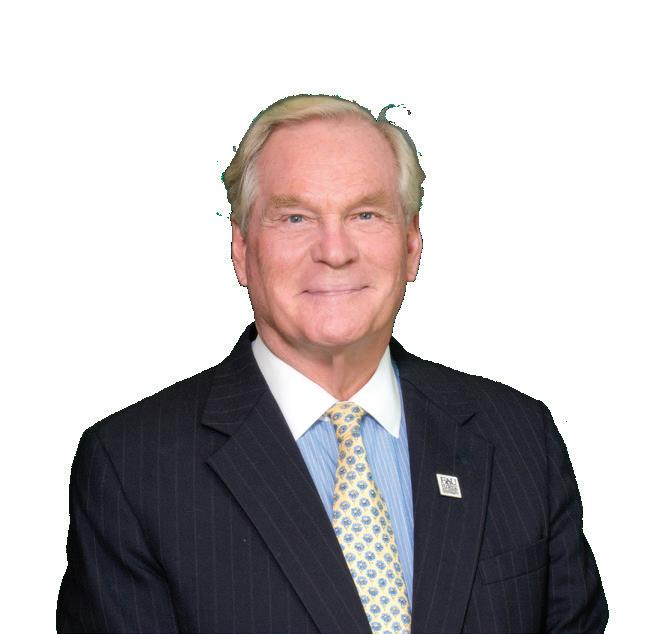
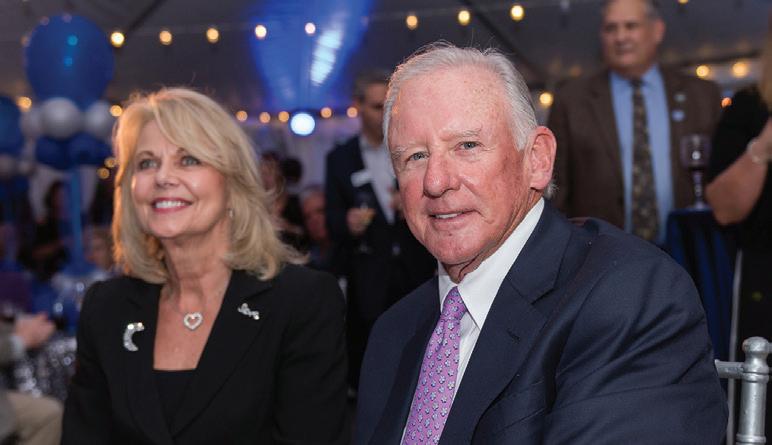
A $1 million gift from Norton and Anita Waltuch in 2021 provides support for medical student scholarships. The Waltuchs are long-time Boca Raton residents, supporting numerous healthcare causes over the years. To honor the Waltuchs, the lobby in the College of Medicine was named the “Anita and Norton Waltuch Lobby.”
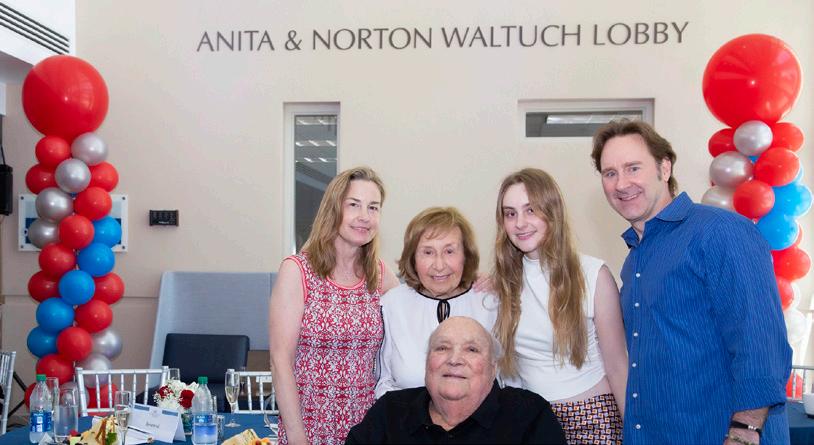
A $600,000 gift from Ronald Altman and Elizabeth Smoltz in 2021 named “The Altman Family Fund for Memory Disorders” in support of activities at FAU focused on memory disorders.

A gift of $100,000 from Michael T.B. Dennis, M.D., College of Medicine advisory board chair, during FAU’s 2022 annual fundraising gala, was matched by the FAU Foundation with an additional $100,000, and supports medical student scholarships. Dr. Dennis has been a generous donor and champion of FAU’s medical school since its inception.
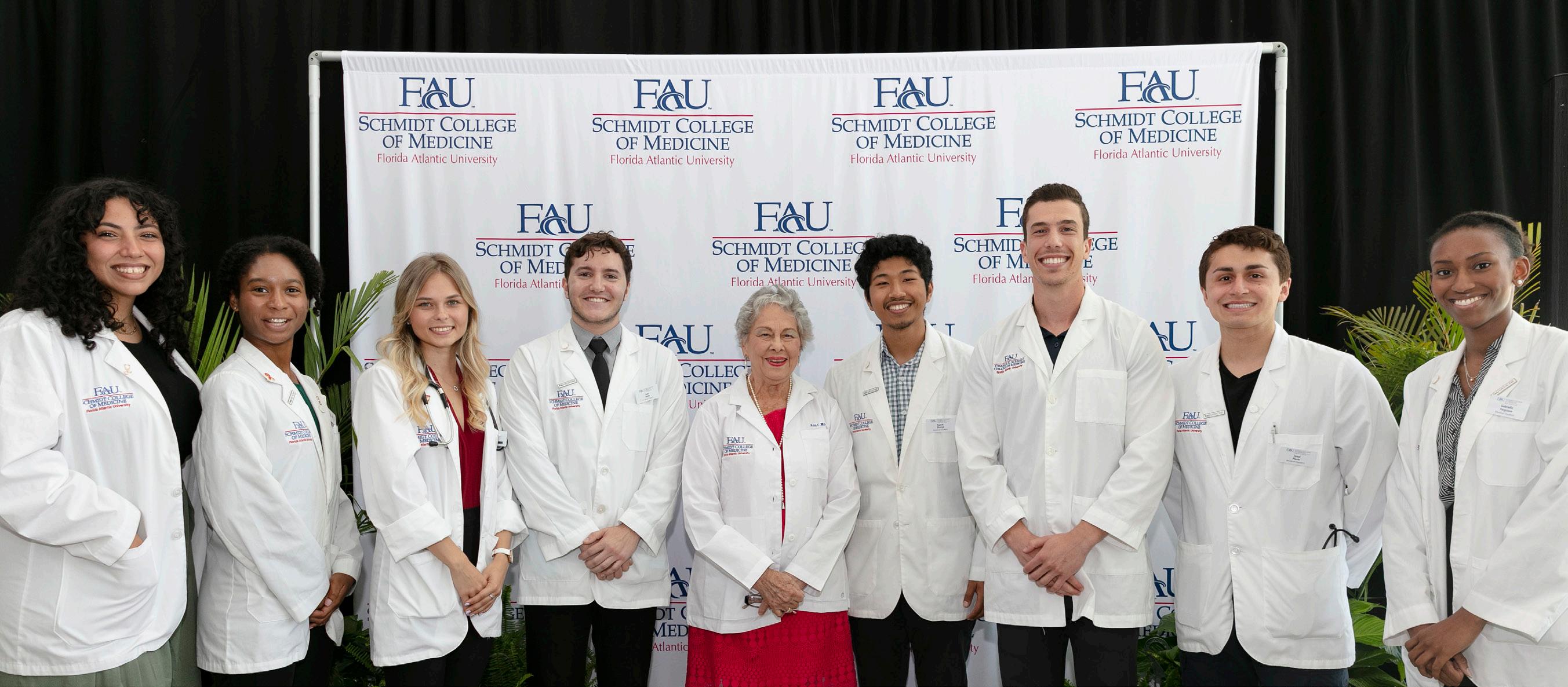
Lisa Clayton, D.O. , associate professor of emergency medicine, is the chair of the Department of Emergency Medicine and serves as program director of the emergency medicine residency.
Anita Fernander, Ph.D. , professor of population health and social medicine, is the interim chair of the Department of Population Health and Social Medicine and serves as the college’s inaugural Chief Diversity and Inclusion officer.
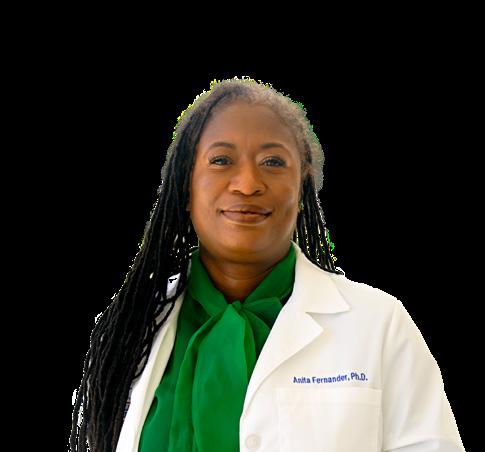
Allison Ferris, M.D. , associate professor of medicine, is the chair of the Department of Medicine, and serves as the program director for the college’s internal medicine residency.
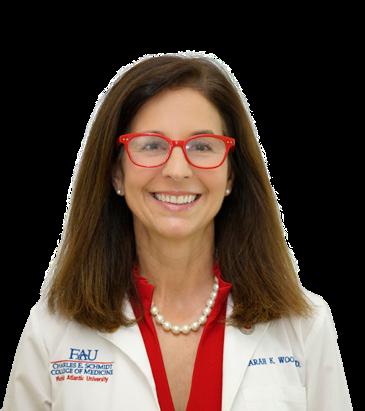
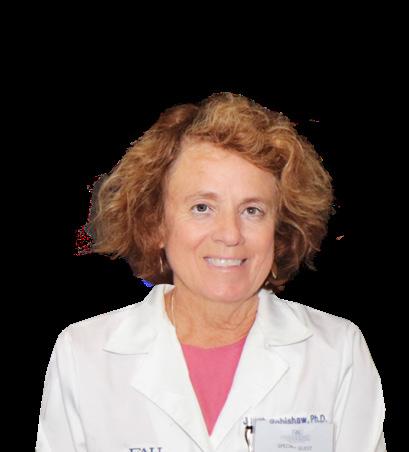
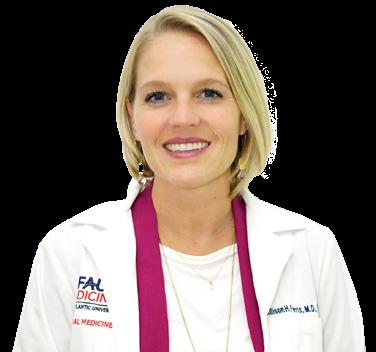
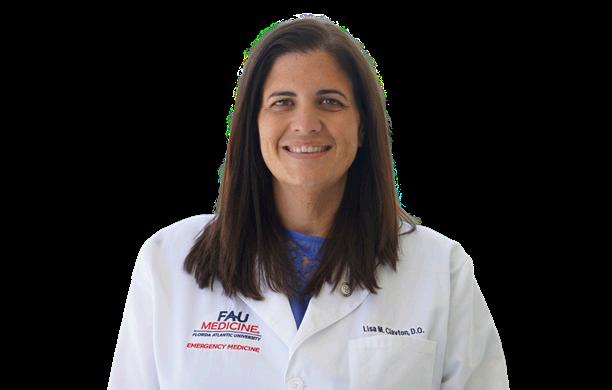
Larry Lottenberg, M.D. , clinical affiliate professor of surgery, is the chair of the Department of Surgery.
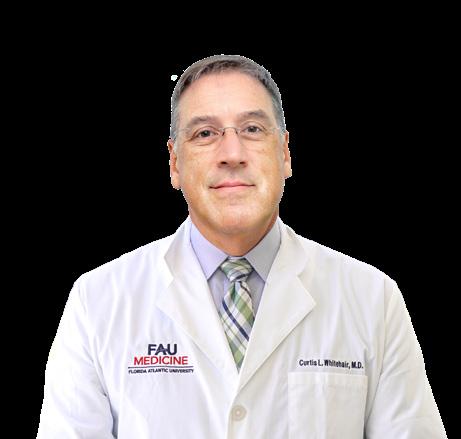
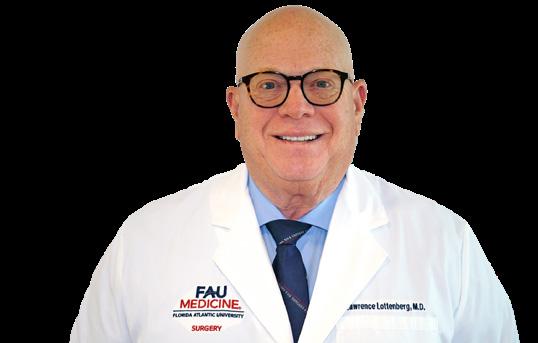

Janet Robishaw, Ph.D. , professor of biomedical science, is the chair of the Department of Biomedical Science, and serves as senior associate dean for research.
Curtis Whitehair, M.D. , associate professor of clinical neurosciences, is interim chair of the Department of Clinical Neurosciences, and serves as the college’s associate dean for graduate medical education and designated institutional officer.
Sarah Wood, M.D. , professor of pediatrics and vice dean for medical education, is the college’s interim chair for the Department of Women’s and Children’s Health.